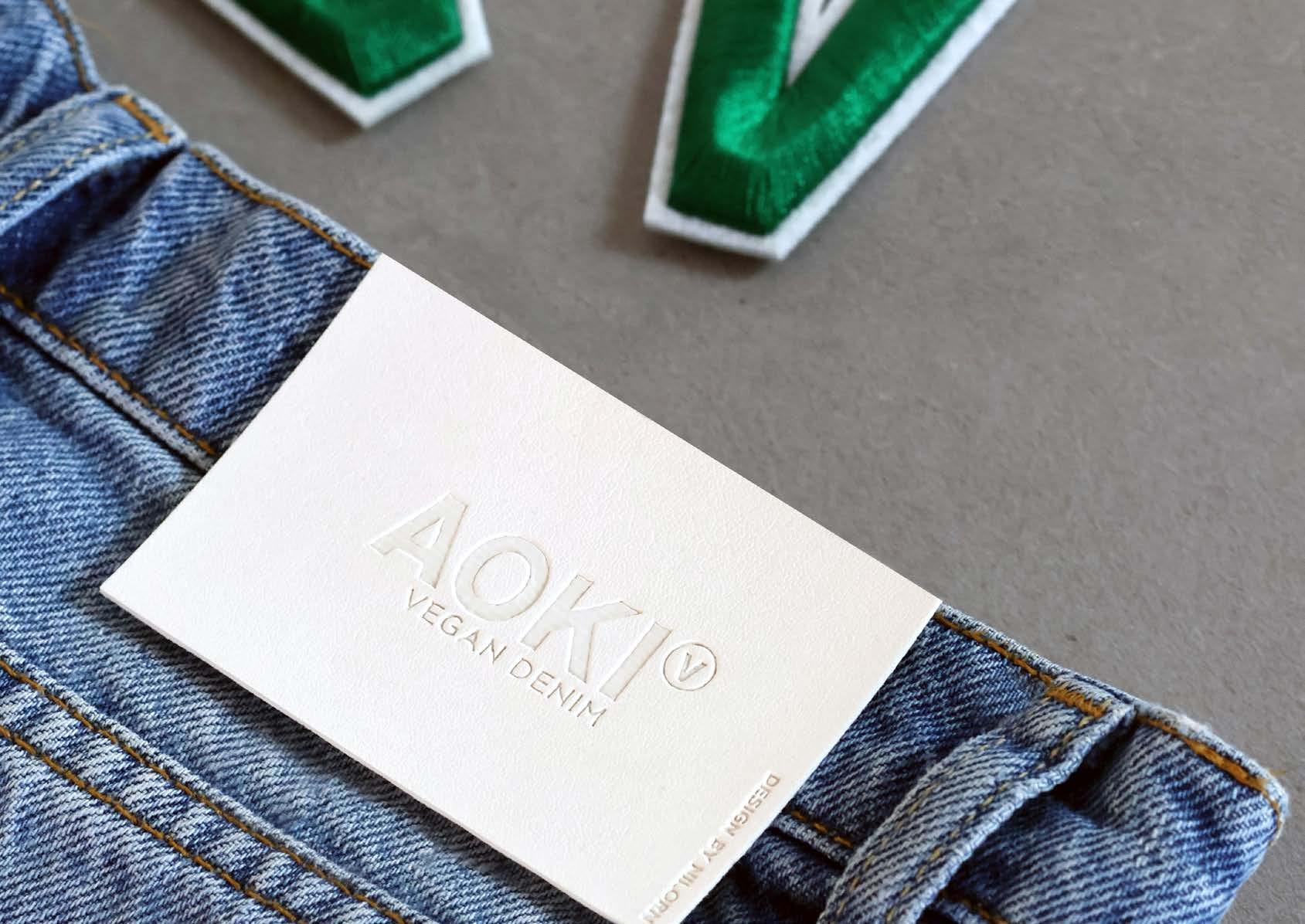

Table of Contents
ABOUT THIS REPORT
This is Nilorngruppen AB’s statutory Sustainability Report for the 2022 fiscal year, prepared according to the Swedish Annual Accounts Act and UNGC’s Communication on Progress requirements. It covers all Nilorngruppen’s operations unless otherwise stated, concerning reporting of specific indicators from our sites. The report has been submitted by the Board of Directors, together with the Annual Report. The Annual Report can be found on our corporate website.
Since 2017, Nilorn has been a signatory to the UN Global Compact Corporate Responsibility Initiative. As a signatory, we voluntarily agree to align our culture, day-to-day operations and strategy with the ten universally accepted UNGC principles in the areas of human rights, labour, the environment, and anticorruption. This commitment requires us to communicate how we align our work and contribute to the ten principles.
The SDGs and our actions
Sustainability risk analysis
Certifications and Standards
Materials and innovation
The Nilorn roadmap to preferred materials
Sustainability starts at the design phase
Traceability and transparency
Quality management
Nilorn applies GRI’s principles for reporting, provides contextual information about the organisation and reports on all company material topics. Nilörngruppen AB has in 2022 acquired the partner company Bally Labels AG in Switzerland, together with two of the employees, who will own 10% each. The acquisition is consolidated in Nilörngruppen from 2023 and will be included in Sustainability report 2023. Our GRI index is available on page 75.
The report is published digitally on the Group’s website (www. nilorn.com/sustainability) and is the basis for the annual Communication on Progress report required from participants of the UN Global Compact.
Nilorngruppen AB is listed on Nasdaq OMX Nordic Small Cap. We strive to live up to our stakeholders’ expectations.
Feedback on our sustainability practices and reporting is welcome. Please contact us at csr@nilorn.com.
CEO Statement
The past few years have brought unprecedented challenges to our world, including weather catastrophes, economic and political crises, and the global pandemic. As an international business, we have faced supply-chain disruptions and shifts in consumer behaviour, but we are committed to playing our part in tackling these challenges.
HOW WE VIEW SUSTAINABILITY
Sustainability is at the core of our business. Our efforts have grown in scope and now touch every aspect of our organisation. In 2022, we placed particular emphasis on the materials used in our products, increasing recycled materials and supporting our clients in recyclability and labelling. This required improved planning and closer collaboration with our suppliers and we strengthened our Sourcing and Compliance department to support this effort. Though still in its early stages, the transition to a circular economy is developing. We are confident that we can play a significant role in transforming our industry by working closely with our clients, suppliers and partners. We have renewed our participation in and commitment to the UN Global Compact and we implement its human rights, labour, environment and anti-corruption principles across our operations and supply chain. Our motto continues to be “walk the talk”.
HOW OUR COMMITMENTS MEET STAKEHOLDER NEEDS
We recognise the importance of traceability in creating more responsible value chains, both environmentally and socially. We closely monitor regulations related to sustainability and regularly review our social and environmental policies to ensure that we meet legal requirements and stakeholder expectations. In 2022, we evolved our Human Rights Due Diligence Procedure to better mitigate human rights risks and track the effectiveness of our actions.
We are also committed to reducing our climate impact, and we are proud to drive positive change in the textile industry by helping our clients reduce their carbon footprints through material innovations, product development and digitalisation. However, we are also taking steps to reduce our environmental footprint, including intensifying our product development team, evaluating the environmental impact of our care labels, and increasing the use of renewable energy. Through our Environmental Training, we share knowledge and create awareness in all parts of the organisation.
As a global employer, we are equally as serious about our efforts to be an inclusive and culturally responsible workplace for the people who make up Nilorn. We remain driven by our purpose to “Add value to your brand”.
HOW WE SEE THE FUTURE
As we look to the future, we are excited about the role technology will play in sustainability. We are well-positioned to support our clients with the upcoming EU Digital Product Passport and in becoming more transparent by using our Nilorn:Connect platform. We commit to our core values of Innovation, Respect and Responsibility, and I am proud of the collective effort of our employees in making Nilorn a company fit for the future.
Krister Magnusson CEO Nilörngruppen AB

Nilorn in brief
> 1500
Clients
OUR OPERATIONS
Founded in Sweden in 1977, Nilorn now has an international reach. We are leaders in visualising brands and strengthening their identity through labels, packaging, trims and accessories. We strive to be future focused in everything we do, from our design process to how our products reach our clients. We continuously innovate to meet our business and sustainability ambitions and provide better choices and solutions for clients.
> 1.7
Billion labels delivered
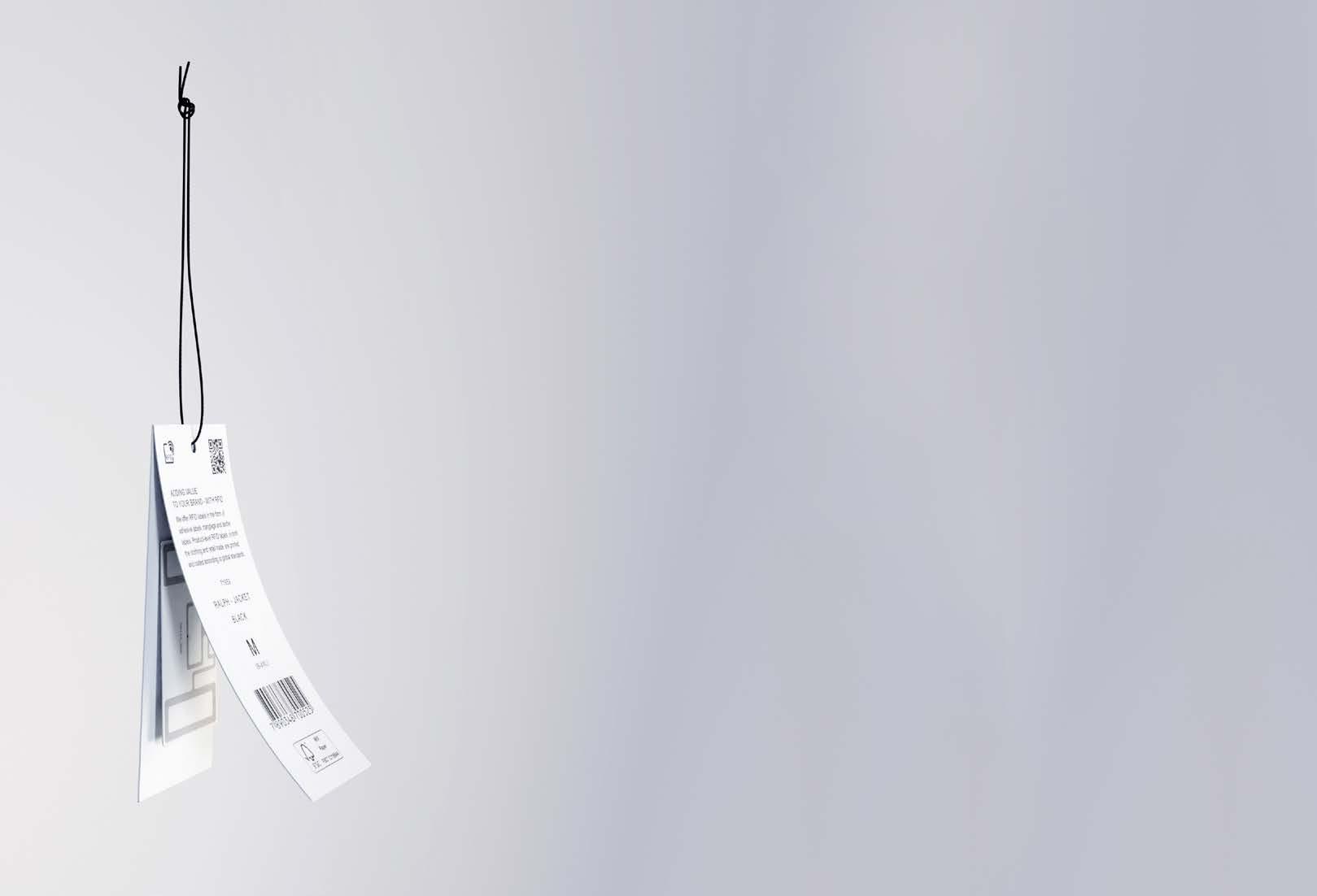
OUR SUSTAINABILITY
591 943
Employees
MSEK Turnover
86 18
Countries with Nilorn operations
Bangladesh, Belgium, China, Denmark, Germany, Hong Kong, India, Italy, Japan, Pakistan, Portugal, Spain, Sweden, Switzerland, The Netherlands, Turkey, UK, USA
Sustainability is an integral part of becoming “more fit for the future” and to lay the foundation, we have built our sustainability work around three areas: Clients, Supply Chain, and Nilorn Own Operations. Each focus area has its key issues.
OUR MISSION ADDING VALUE TO YOUR BRAND
Nilorn has been recognised as a Nasdaq ESG Transparency Partner since 2019. The recognition is presented to companies that display a high level of transparency to their investors regarding Environmental, Social and Governance (ESG) issues.
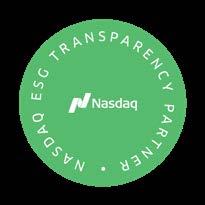
HIGHLIGHTS 2022
NILORN PREFERRED MATERIALS INDEX - A TOOL BASED ON CIRCULAR PRINCIPLES
To provide guidance to alternative material sourcing, Nilorn’s Material Team has developed an internal roadmap: The Nilorn Preferred Materials Index (PMI). Read more on page 30.
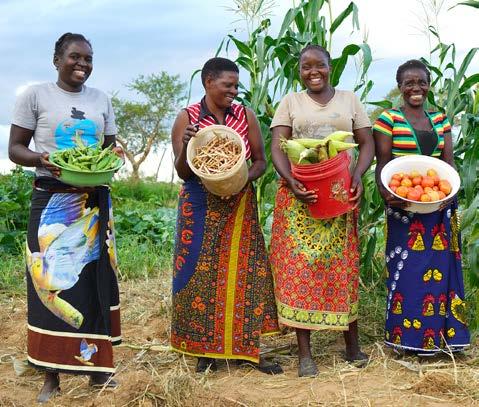
INCREASED RENEWABLE ELECTRICITY
MARCH FOR WATER
Access to clean water is a human right and a prerequisite for health. One in ten people globally lack clean water. The March for Water campaign highlights the global water crisis and raises awareness of the problem. Through an app provided by WaterAid, we log steps and physical activities, so we can challenge ourselves and compete internally between departments and countries. All part of showing solidarity for people who don’t have easy access to clean water.
NILORN:CONNECT
This is our platform of digital services to help brands fulfil the increasing demands of transparency and traceability within the textile and fashion industry, for example, the Digital Product Passport. Read more on page 37.
LIFE CYCLE ASSESSMENT SCREENING OF CARE LABELS
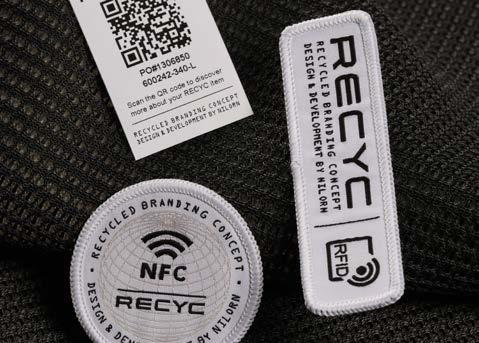
With the support of Miljögiraff, an LCA was carried out to gain a better understanding of what is most materially significant for the environmental impact of care labels produced by Nilorn. This allows us to identify effective measurements to mitigate negative impacts and amplify positive impacts. Read more on page 42.
We check the availability of renewable energy in all our locations to enable the transition. Our operations in Belgium, Denmark, Germany, Portugal and Sweden all use renewable energy through agreements. In 2022, we increased our purchase of renewable energy certificates (IREC) and reached 57% renewable electricity across the Group.
WE JOINED THE EUROPEAN OUTDOOR GROUP
The European Outdoor Group (EOG) gives us access to information and insights and enables us to cooperate on industry-related topics like packaging materials. We are also part of their Single-Use-Plastic initiative.
Together we registered over 25 million steps and the campaign reached an incredible 1 billion steps!
18 YEARS OF COMMITMENT TO SUSTAINABILITY


THE NILORN OFFER
Nilorn is a leading development hub focusing on strengthening our clients’ identities. Our business of visualising and refining brands rests on six pillars: Sustainability, Design, Product Development, Production, Logistics and Global Presence. With these building blocks, we provide a comprehensive offer to enable our clients and their brands to develop. In short, we add value to your brand.
THE NILORN CORE VALUES help guide every employee on a daily basis in all work situations. They form a common platform and strengthen our teamwork.
• Innovation – offer innovative and superior solutions
• Respect – respect and trust each other
• Responsibility – take ownership
SUSTAINABILITY
Sustainability is a central part of our business. Our strategy is based on Nilorn’s vision, core values and the UN Global Compact’s ten principles on human rights, labour law, the environment and anti-corruption.
DESIGN
Unique design and tailor-made concepts for various client sectors. An experienced and multi-skilled team delivers creative, intelligent and original solutions.

PRODUCT DEVELOPMENT
Based on design and high-quality technical solutions, we develop products using the latest materials and techniques in all areas of branding, like labelling and packaging. Development happens in close cooperation with our clients and through our own design collections, which provide great opportunities to investigate and refine.
PRODUCTION
Thanks to our well-established network of production partners and our own production, we can collaborate with both small and large clients with a presence in several markets, which, as a rule, require local sourcing solutions.
LOGISTICS
We deliver products to our clients’ suppliers through our strategically located distribution units. This means local service and short lead times. Our online platform provides both clients and manufacturers with a complete overview, from an effective ordering process to follow-up and reporting possibilities.
GLOBAL PRESENCE
Nilorn operates worldwide with local production in several countries across multiple continents. This global presence gives us an immense knowledge of different business cultures and proximity to the market.
We work closely with our clients to find the most sustainable solutions to meet their needs.
Our products are a part of other products, so our key role in this area is to deliver the correct product on time to minimise potential disruption and waste.
We help our clients use our products as a platform to provide consumers with transparent sustainability information.
Circular thinking is designed into our products from the drawing board.
NILORN VALUE CHAIN
PRODUCT DEVELOPMENT
We strive to ensure the client’s ambitions and our interpretation and design result in products that have as low environmental impact as possible.

We have less influence in this area, but where we can, we work close to our client’s production sites to minimise distances and therefore transport emissions and focus on fill rate and joint loading to create efficient solutions.
End of life starts at the beginning by designing for less waste and with possibilities for reuse and recycling, as well as responsible waste handling in our production.
We monitor and improve the production conditions, including factory environmental performance, occupational health and safety and other labour conditions for the workers.
We integrate a sustainability perspective in every part of our value chain, whether directly or by influencing our partners and spreading best practice.
HOW WE WORK
Our CSR and Sustainability Advisory Team (CSAT) consists of staff from different Nilorn offices, representing the design department, product development, production, purchasing, sales and CSR. It aims to coordinate group-wide priorities and ensure best practice sharing across the organisation and further integrate CSR and sustainability into daily operations, document and share knowledge. To ensure integration of sustainability and CSR aspects into key functions such as purchasing, production and human resources, Nilorn has established cross-regional teams that meet regularly and where all regions are represented.


Daily CSR and sustainability activities are facilitated by the sustainability team and led by the Sustainability Manager, who is also responsible for the company's sustainability policies and processes.




Our CSR manager is based in Nilorn East Asia, Hong Kong, and in 2022 we strengthened our global team by adding a CSR Specialist Supply Chain in Europe. The team supports our sustainability work alongside local staff in our sourcing and production countries. We also have regular meetings with the management group and participate in meetings with the Board of Directors, which is the ultimate responsible to overseeing our sustainability impacts. Participation in board meetings is at least twice a year and includes approval of material topics and reporting. New members of the board receives an introduction to Nilorn CSR & Sustainability work and the board is also informed about upcoming legislations.



Nilorngruppen is governed by its Board of Directors, that during 2022 held 11 meetings, in which our CEO and selected Advisory Panel members participated.


Nilorn’s Advisory Panel consists of the Group Sales Manager, IT Manager, Chief Financial Manager, Head of Design, Retail Information Service Manager, Head of Production & Supply Chain and Sustainability Manager. Meetings are held monthly.

"We are a positive and progressive team, sharing lessons learned and supporting the Nilorn organisation, our suppliers and clients."
Our sustainability approach
We deliver products to over 80 countries worldwide and are thus part of far-reaching supply chains. Such a global presence calls for global responsibility and our approach begins with ensuring we operate our business responsibly. We aim to be leaders in sustainability in our industry and provide our clients with sustainable and innovative products and services. We believe our products play an important role in the transition of the fashion and textile industry, carrying legally required labelling, guidance and recommendations it supports consumers in making informed choices.
Sustainability is embedded in our culture and by signing the UN Global Compact, we commit to the continual improvement of our practices. We drive sustainable development and awareness within our own organisation as well as our suppliers, clients and other stakeholders. We focus our initiatives on areas where we have the most significant impact and the best opportunity to contribute to positive development.
Therefore, we have selected three focus areas where we summarise our ambitions and efforts:
• Clients

• Supply Chain
• Own operations
The areas have been selected based on materiality analysis and stakeholder dialogue, in which we assess stakeholder expectations for our sustainability initiatives.
UPDATED MATERIALITY ANALYSIS 2022
To meet GRI's revised standards, Nilorn conducted a materiality analysis and stakeholder dialogue in autumn 2022. The
materiality analysis aimed to identify Nilorn’s material topics based on the company's most significant impacts on the economy, environment and people, including human rights. In this process, Nilorn’s actual and potential negative and positive impacts were mapped, and several stakeholder perspectives were included. The process of identifying material topics included the following steps:
Step 1: Mapping Nilorn’s sustainability context
To understand the impact Nilorn has or could have on the world, activities and business relationships were mapped. This step served to increase our understanding of the industry in which Nilorn operates, the industries we come in contact with in the value chain and the challenges that exist in these industries and in society at large.
Step 2: Identification of actual and potential impact
To produce a preliminary list of Nilorn's actual and potential impacts, a desktop analysis was carried out based on our industry and value chain. The analysis was based on a review of internal documentation and external sources.
In connection with this step, a stakeholder dialogue was carried out with the aim of gaining a better understanding of our operations, identifying the impact that Nilorn has on the outside world, and the severity of the impact. The dialogue was conducted through ten qualitative interviews with several stakeholders. The following stakeholder groups were interviewed:
• Nilorn representatives
• Investors
• Experts in the textile industry and circularity
• Clients
The results of the stakeholder dialogue directly informed the impact Nilorn has or could have and how significant it is.
Step 3: Assessment of the impact’s significance
The mapping and stakeholder dialogue resulted in a gross list of Nilorn's positive and negative impacts that we have or could have on the environment, economy and people, including human rights. The significance of the impact was then assessed quantitatively using the results of the stakeholder dialogue and external sustainability experts. Nilorn's impacts were compared and negative impacts and positive impacts were analysed separately. The significance of negative impacts was assessed based on severity, a combination of scale, scope and remediation. The significance of positive impacts was assessed based on scale and scope. For potential impacts, probability was also accounted for.
Step 4: Prioritisation of the most significant impact
Based on the analysis in step 3, the impacts were prioritised from high to low significance. A threshold was set based on discussions internally and with external sustainability experts. The table below shows the result, which has also been validated by Nilorn's management team and other key representatives. Thirteen impact areas were identified as most significant and therefore correspond to our material topics. Of these, three are new topics: biodiversity and ecosystems, economic development and local communities. We continue to work with all material topics from previous materiality analyses, as all are considered to have a major impact. Our approach is wider and this is reflected in the topic description. These topics will guide the content of Nilorn’s sustainability report and work going forward. In 2023 we will update our current targets and include all material topics.
MOST MATERIAL SUSTAINABILITY TOPICS
Biodiversity and ecosystems
GHG emissions
Materials
Product development
Resource efficiency (energy, waste, water)
Diversity, equality and inclusion
Economic development
Health and safety
Human rights
Local communities
Ethical business and anti-corruption
Knowledge sharing
Product development
The table below outlines how we engage with stakeholders affected by and/or who have an influence on our activities and the topics they have identified as key for Nilorn’s work:
STAKEHOLDER FREQUENCY DIALOGUE/ CHANNEL
Employees Appraisal talks
Employee survey Sales conference
Sourcing and Logistics conference
Internal trainings
Intranet
Clients
Meetings
Fairs Magazine
Investors
Financial reports Interim reports
Annual meeting Webpage
Suppliers
Dialogue Supplier package
Supplier assessments
Annual Twice a year Annual Annual Ongoing
PRIORITISED QUESTIONS
Human rights
Health and Safety Ethical business and anti-corruption Diversity, equality and inclusion
WHAT
Employee development, see page 65 Focus on training, see page 65 Digital material library Employee survey, see page 64
Ongoing Three times a year Annual
Annual Quarterly Annual Ongoing
Materials Product development Knowledge sharing Biodiversity and ecosystems
Ethical business and anti-corruption Biodiversity and ecosystems
Ongoing Resource efficiency Ethical business and anti-corruption
Health and Safety
Human rights
Knowledge sharing Product development
Society
Collaboration with universities and schools
Networks and working groups
Survey
Ongoing Materials Product development Knowledge sharing
Using digital meeting tools Attending fairs Nilorn Branding & Design Magazine
Stable and long-term total return Corporate governance Transparent report
Nilorn General Agreement and Supplier Handbook, see page 42-44
Supplier Code of Conduct

Virtual audits and Sedex, see page 44-45
Participate in networks such as UN Global Compact, AAFA, RISE Chemicals group and TEKO
Follow initiatives such as Ellen MacArthur Foundation
Supporting our clients to be more fit for the future
We see sustainability as an integral part of becoming more fit for the future. Nilorn’s sustainability strategy is based on our mission, “Adding value to your brand”, together with the global Sustainable Development Goals (SDGs) and the materiality analyses carried out in 2019 and 2022. The strategy is built around three pillars: Clients, Supply Chains, and Nilorn Own Operations. Each area has its essential sustainability issues, challenges and goals described in more detail later in the report.

For more information on how Nilorn’s material topics align with the SDGs and how we contribute to achieving the 2030 Agenda, see the table on the next page. Each focus area later in the report describes our work in more detail.
POLICIES
To ensure the proper implementation of our strategy, we have developed several internal policies that support our vision and values:
• Animal welfare policy
• Anti-corruption policy
• Code of ethics and business conduct
• CSR policy
• Environmental policy
• Human resource policy
• Human rights policy
The Supplier Code of Conduct, together with responsible sourcing supportive policies in our Supplier Handbook, sets out the expectations of suppliers and business partners. How we work with the policies is presented in each of the following sections within our focus areas.
ENVIRONMENT GOVERNANCE SUPPLY CHAIN ENVIRONMENT SOCIAL GOVERNANCE
Biodiversity and ecosystems
GHG emissions
Materials
Knowledge sharing
Product development
Biodiversity and ecosystems
GHG emissions
Materials
Resource efficiency
Health and safety
Human rights
Local communities
Ethical business and anti-corruption
Knowledge sharing
Product development
Biodiversity and ecosystems
GHG emissions
Materials
OPERATIONS ENVIRONMENT SOCIAL GOVERNANCE
Product development
Resource efficiency
Diversity, equality and inclusion
Economic development
Health and safety
Human rights
Local communities
Ethical business and anti-corruption
Knowledge sharing
Product development
100% of packaging products delivered are recyclable or reusable
Clients choose environmentally-friendly transportation alternatives
Textile labels in polyester are 100% recycled material
Paper labels and packaging are 100% certified and traceable paper
Increased awareness about labels, trims and packaging
Traceability of products
Connected product solutions
100% of preferred suppliers have an environmental audit
100% of wastewater returned to the environment safely 50% of preferred suppliers energy is from renewable sources
Traceability of materials
100% of chemicals used will conform to, or will enable end products to conform to, our environmental and social guiding principles
Responsible sourcing including Restricted Chemical List bluesign® System Partner
100% of preferred suppliers have a social audit
Procedure in place for HRDD, including supply chain data along with gender information
100% of preferred suppliers sign General Agreement and Supplier Handbook, including Code of Conduct
Support community-building initiatives
100% of preferred suppliers sign General Agreement and Supplier Handbook, including anti-corruption policy
Take an active role in sharing knowledge and educating our supply chain
Map our supply chain back to raw material level enabling full supply-chain traceability
100% of waste water returned to the environment safely
Reduce air transportation by 50% (base year 2019)
100% of communication and packaging materials in recycled and/or certified material
Chemical management
100% renewable energy and zero waste to landfill
100% of chemicals used will conform to, or will enable end products to conform to, our environmental and social guiding principles
40-60% gender balance in Nilorn units, and aim for 50% on Group level
We are an employer of choice, with a retention rate above 95%
Awareness and usage of provided Personal Protective Equipment (PPE) Wellness program
All Nilorn production and distribution centres are SMETA audited
Nilorn is involved in communities around our facilites
100% of Nilorn units offerer an employee engagement program
All employees take part in and agrees with anti-corruption policy
Zero tolerance for corruption and encouraging use of whistleblowing tool
We continuously increase number of training hours/employee in all parts of the organisation
Implemented the Nilorn Preferred Material Index
100% of Nilorn internal design collections in sustainable materials
Design for cyclability
Commitment to the UN Sustainable Development Goals (SDGs)
We support the SDGs and how they address the global challenges we face. Though all the goals are key to achieving a more sustainable society, Nilorn’s contribution to the 2030 Agenda is most significant to six goals: SDG 5, 6, 8, 12, 13 and 17.

THE SDGs, IDENTIFIED TARGETS & HOW OUR ACTIONS CONTRIBUTE
Achieve gender equality and empower all women and girls
5.1 End all forms of discrimination against all women and girls everywhere.
5.5 Ensure women’s full and effective participation and equal opportunities for leadership at all levels of decision-making in political, economic and public life.
We regularly monitor and takes active measures to prevent discrimination and to promote equal rights and opportunities regardless of gender, transgender identity or expression, ethnicity, religion or other belief, disability, sexual orientation or age. Gender equality is a critical issue for global supply chains in particular, as there is an opportunity to make a big impact by creating jobs and sources of income for women.
Diversity, equality and inclusion
Human rights
Local communities
Ensure availability and sustainable management of water and sanitation for all
6.1 By 2030, achieve universal and equitable access to safe and affordable drinking water for all.
6.2 By 2030, achieve access to adequate and equitable sanitation and hygiene for all and end open defecation, paying special attention to the needs of women and girls and those in vulnerable situations.
6.3 By 2030, improve water quality by reducing pollution, eliminating dumping and minimizing release of hazardous chemicals and materials, halving the proportion of untreated wastewater and substantially increasing recycling and safe reuse globally.
In our supply chain, we can work with water issues directly by being more efficient in the processes that require water and ensuring proper waste-water treatment. Access to water and sanitation are human rights, we promote proper WASH-facilities in production and supply chain. We also indirectly take part in projects aiming at improving the conditions further upstream, such as through our engagement with WaterAid and Cotton made in Africa, read more on page 32.
Biodiversity and ecosystems
Resource efficiency (energy, waste, water)
Health and safety
Human rights
Knowledge sharing
Local communities
Promote sustained, inclusive and sustainable economic growth, full and productive employment and decent work for all
8.7 Take immediate and effective measures to eradicate forced labour, end modern slavery and human trafficking and secure the prohibition and elimination of the worst forms of child labour, including recruitment and use of child soldiers, and by 2025 end child labour in all its forms.
8.8 Protect labour rights and promote safe and secure working environments for all workers, including migrant workers, in particular women migrants, and those in precarious employment.
We commit to implementing social standards, such as living wages and decent working conditions in our supply chain. New suppliers are screened, and we encourage our suppliers to adopt quality, environmental and occupational health and safety management systems and certifications and to include certification schemes used by suppliers in our criteria for the choice of suppliers.
Resource efficiency (energy, waste, water)
Diversity, equality and inclusion
Economic development
Health and safety
Human rights
Ethical business and anti-corruption
THE SDGs, IDENTIFIED TARGETS & HOW OUR ACTIONS CONTRIBUTE
Ensure sustainable consumption and production patterns
12.5 By 2030, substantially reduce waste generation through prevention, reduction, recycling and reuse.
12.8 By 2030, ensure that people everywhere have the relevant information and awareness for sustainable development and lifestyles in harmony with nature.
We have adopted policies to choose more preferred materials, increasing the use of recycled materials and acting for sound chemical management. Nilorn has joined the bluesign® system to put the whole production chain in focus and strive to protect health and the environment across the entire chain of production. Since 2020 we have implemented Higg FEM in our production and supply chain. Read more about it on page 48.
Biodiversity and ecosystems
GHG emissions
Materials
Product development
Resource efficiency (energy, waste, water)
Health and safety
Human rights
Ethical business and anti-corruption
Knowledge sharing
Take
13.3 Improve education,
and
Increasing the use of green electricity, installing solar panels on roofs and working to reduce energy consumption in our own units all help combat climate change. We are also implementing Higg FEM to better understand energy use in our supply chain. We assure all employees participate in our Basic Environmental Training.
Climate change has a high impact on water, through our partnership with WaterAid we address the issues in own operations and supply chain.
GHG emissions
Product development
Resource efficiency (energy, waste, water)
Knowledge sharing
Strengthen the means of implementation and revitalize the global partnership for sustainable development
17.16 Enhance the global partnership for sustainable development, complemented by multi-stakeholder partnerships that mobilize and share knowledge, expertise, technology and financial resources, to support the achievement of the sustainable development goals in all countries, in particular developing countries.
The achievement of the SDGs depends on the collaboration of many different actors, including businesses. As a small but global player, Nilorn has to co-operate with others and participate in business initiatives, such as UN Global Compact, Sedex and RISE Chemicals Group. Also, by aligning with standards and certifications like bluesign®, Oeko-Tex® and GRS.
Materials
Product development
Resource efficiency (energy, waste, water)
Knowledge sharing
Sustainability risk analysis
Nilorn’s risk management approach follows our decentralised structure, which also applies to our sustainability risks. All managers with operational responsibilities are expected to ensure that risks associated with their operations are appropriately identified, evaluated and managed. The Board has overall accountability to Nilorn’s owners, while operational-level risks are controlled by each country CEO, its management team and other relevant employees.
INTERNAL CONTROL
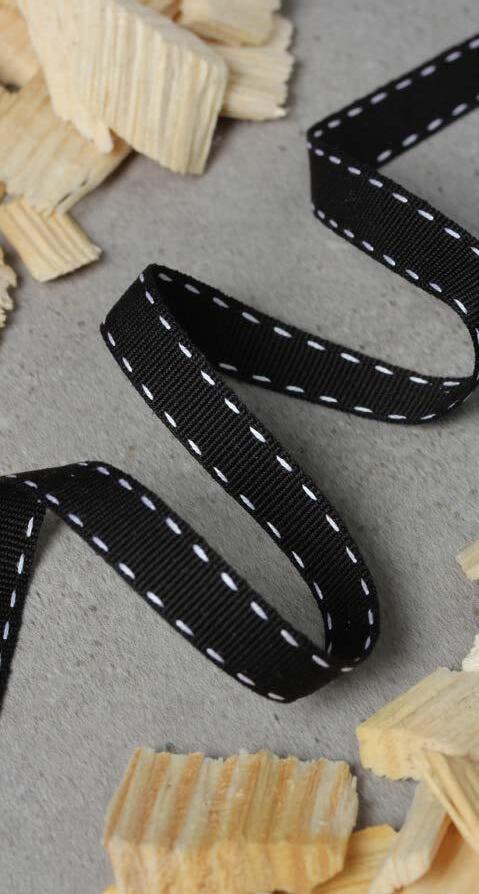
We conduct regular internal audits of premises activities, which include effective implementation of policies such as the Code of Conduct, the Code of Conduct for Suppliers and the Anti-Corruption Policy.
INSURANCE
Nilorn has Group-wide insurance that is reviewed annually by an independent third party. The insurance covers, among other things, property, product liability, business interruption, transport, and directors’ and officers’ liability. Insurance was renewed prior to 2022.
To ensure all Group companies follow Group guidelines, we have introduced a control system to verify the various processes and ensure that financial reporting is correct. The controls for the various processes and risk elements are assessed through self-assessment, internal audit and internal meetings. The answers are verified by the company’s external auditors.
We do not have a separate internal audit function. However, we have a defined process for evaluating and monitoring internal control. A self-assessment is carried out by each Group company for key areas where they assess whether they follow the routines set for the Group. They also fill out a questionnaire regarding the internal control for monitoring functions, including areas like governance, risk assessment, information/communication and monitoring
and follow up. In addition, the companies are audited internally according to a rolling schedule based on size and unpredictability; this helps verify that the self-assessment is accurate. In 2022 Nilorn Bangladesh, East Asia and Turkey were audited on site. The outcome of the self-assessment, questionnaire and any internal audits are presented to the Audit committee each autumn. No significant instances of non-compliance with laws and regulations were reported during the financial year 2022.
In 2022, COVID-19 continued to impact risk scenarios and ways of working, Nilorn Shanghai operations were closed for two months and employees worked from home. Priorities in these complex scenarios are human safety and the protection of life.
Ethical business and Anti-corruption
• Risk of unethical behaviours and the impact on people and environment.
• Risk of corruption, especially in high-risk countries.
• Our anti-bribery and corruption policy clearly identifies what conduct is prohibited and how to report suspected violations, the policy is signed by all employees and staff training was carried out in 2021.
• The Supplier Handbook, including the Supplier Code of Conduct, was updated in 2021 and communicated with the suppliers.
• Third-party social audit at production units, in 2022 91% of our purchase value in risk classified countries was at third-party audited suppliers.
• Nilorn Code of Ethics and Business Conduct is a guide to the values, behaviours and ways of working for all our employees. A more hybrid work environment may imply a risk of less control, compliant behaviour for both working from home and office premises are monitored by each managing director.
Biodiversity and Ecosystems
• Impact of less predictable and more severe weather.
• Risk of our operations' impact on climate change through CO2 emissions.
• Use of fossil-based materials like polyester, managing increased demand of more environmentally conscious products by our clients.
• Waste from productions impact on environment.
• Products delivered may have an impact if not disposed correctly by end-consumer.
Health & Safety
• Work-related injuries and sicknesses.
• Risk that employees find the work environment unsatisfactory, resulting in difficulty in retaining and recruiting.
• Fatal accidents, serious injuries or long-term absence.
• COVID-19 impact on working conditions.
Human rights
• Risk of poor working conditions, discrimination and not demonstrating respect for human rights in our workplace and in the supply chain.
• Valuable competence could be lost, thereby decreasing the innovative capacity.
• Lack of diversity and equality.
Supply chain
• Risk of suppliers not complying with the Code of Conduct and not following national laws and regulations.
• Lack of established supply chain of preferred materials.
• COVID-19 impact on supply chain with delivery disruptions.
• Focus on improved efficiency to minimise environmental impact in our operations and supply chain, bluesign® certification being one method and Higg FEM supporting measuring.
• Awareness of new regulations and market demands.
• Measuring emissions from energy consumption, transportation and travel and continuing to introduce more renewable energy at our production sites and offices.
• Focus on recycled raw materials where they are available and use of plant-based alternatives to reduce dependency on fossil-based materials.
• Guide and inform about required labelling.
• Continuous training of all employees in health and safety and effective management systems, including health and safety risk assessments.
• Follow up on Code of Conduct via third-party audits and own inspections.
• Screening of potential suppliers by the sourcing and CSR department.
• Safe work practices via awareness building and adjusting workspace and/or place. We enable remote and agile working styles when possible.
• Implement and follow up on Code of Conduct. Third-party social audit at own production units and external suppliers, along with own inspections.
• Human Rights Due Diligence Procedure implemented.
• Potential suppliers are screened by the sourcing and CSR department. In our Modern Slavery Statement, we report how we work to mitigate the risk.
• When recruiting, aim to attract a more diverse workforce, including younger employees to the company.
• Client
• Product development
• Manufacturing
Strategic
• Risk of not focusing the sustainability work appropriately, key areas are missed and/or questions are not handled properly.
• Risk of thinking and acting only in the short term due to COVID-19.
• Continue to build strong supplier relationships, the updated supplier manual and policies state the prerequisites for our suppliers.
• Use digital meetings and consider the use of new supply chain technologies to follow up on supplier compliance with social and environmental standards.
• Potential suppliers are screened by the sourcing and CSR department.
• We are members of Sedex and use the SMETA audit for suppliers.
• Consolidate supply chain and focus on preferred suppliers.
• Collaborate with supply chain for the development of new materials.
• Working closer with logistic partners and increase consolidation of shipments to avoid delivery delays.
• The way we interact with clients and other stakeholders has changed. More digital solutions are available.
• We communicate the sustainability strategy both internally and externally through personal meetings and digital channels.
• We engage with the stakeholders to understand their expectations.
• Design
• Product development
• Production
• Logistics
• Client
• Design
• Product Development
• Manufacturing
• Production
• Manufacturing
• Production
• Logistics
• Client
• Product development
• Production
Certifications and standards
Sustainability perspectives are increasingly the focus for both our clients and us throughout our practices and business relationships. In some areas, the use of standards and labels is a way of clarifying the work. Some provide thirdparty verification of business practices and offer transparent communication about which standards we stand by. Many standards overlap in areas like social compliance, and some are specific to a certain topic, which makes it difficult to navigate. In the table below, we present an overview of the standards we most commonly use and their focus areas, and our supply chain documents:
Sedex/SMETA – Sedex has created the Sedex Members Ethical Trade Audit (SMETA)–a common audit methodology and report format aiming to drive consistency of data from the auditing process. The SMETA audit checks specifically against the ETI base code and how it is distributed to employees and the supply chain, relevant local laws, environmental performance, subcontractors/home workers, eligibility to work and understanding of the ETI base code. Read more about how we participate in Sedex on page 47.
BSCI – Business Social Compliance Initiative, an initiative of Amfori, is a common, standardised approach for monitoring social standards in all supplier countries for all consumer goods. BSCI is not a certification system; rather, it provides a specific process with uniform management instruments for members, suppliers, auditors and qualifiers. Nilorn is not a member of Amfori, but we have external suppliers that are audited and part of the BSCI.

bluesign® − The bluesign® SYSTEM uses strict auditing and chemical management to eliminate harmful substances throughout the supply chain, including responsible use of resources, production with a minimum impact on people and the environment and the highest level of consumer safety. Nilorn Portugal has been a bluesign® SYSTEM PARTNER since 2012 and Nilorn East Asia since 2017.
OEKO-TEX® STANDARD 100 – A worldwide consistent independent testing and certification system for raw, intermediate and end textile products at all stages of processing. OEKO-TEX® STANDARD 100 has been the base for Nilorn’s textile product offer for many years, and today we offer woven and printed certified labels as well as some metal and plastic accessories and heat transfers. OEKO-TEX® STANDARD 100 certification means that a product, material, accessory, or other textile-related good has been tested for substances that could harm human health.
OEKO-TEX® LEATHER STANDARD − An internationally standardised testing and certification system for leather and leather goods at all production levels, including accessory materials. The certification supports companies along the supply chain with the implementation of high human-ecological product safety.
GRS – The Global Recycled Standard is an international, voluntary, full product standard that sets requirements for third-party certification of recycled content, chain of custody, social and environmental practices and chemical restrictions. The objectives of the GRS are to define requirements to ensure accurate content claims and good working conditions and that harmful environmental and chemical impacts are minimised.
GOTS − The Global Organic Textile Standard is a voluntary global standard for organic fibres, including ecological and social criteria, backed up by independent certification of the entire textile supply chain. Key provisions include a ban on the use of genetically modified organisms (GMOs), highly hazardous chemicals and child labour, while requiring strong social compliance management systems and strict wastewater treatment practices.
FSC™ – The Forest Stewardship Council™ is an international non-profit organisation dedicated to promoting responsible forestry. FSC™ certifies forests all over the world to ensure they meet the highest environmental and social standards, and products carrying the label help assure consumers that they meet the requirements. The FSC™ system also provides a way of tracking forest products through independently verified Chain of Custody (CoC) certification, which verifies that a product contains wood from a certified forest and/or recycled material.
Cradle to Cradle Certified® − Is a set of design principles that stands for innovation, quality and beneficial design. We use a selection of Cradle to Cradle Certified® materials, including compostable textile fibre and stone paper. Cradle to Cradle Certified® is the global standard for products that are safe, circular and responsibly made. The certification helps companies to innovate and optimize materials and products according to advanced science-based measures.
Blue Angel – An environmental label that was initiated by the German government in 1978. The label is designed to act as a guide for sustainable purchasing for consumers and procurement departments. The label sets out specific standards that need to be met, with respect to environmental, health and performance characteristics. The Blue Angel promotes the concerns of both environmental protection and consumer protection. The ecolabel requires that plastic recycling follows the EUCertPlast certification scheme.
EuCertPlast – A certification for plastic recyclers. The scheme focuses on traceability of plastic materials throughout the entire recycling process and supply chain, and on the quality of recycled content in the end product. The certification scheme itself works according to the European Standard EN 15343:2007.
The Leather Working Group (LWG) – A not-for-profit organisation that aims to improve the environmental impact of the leather industry by assessing and certifying leather manufacturers. LWG provides guidance and auditing tools so its members can make informed, sustainable choices.

(FEM)
Higg Facility Environmental Module (FEM) – The Higg Index, developed by the Sustainable Apparel Coalition (SAC) in 2012, has become the leading module for the standardised measurement of value-chain sustainability. The Index offers a suite of tools for different types of businesses. The Higg FEM allows us to understand our environmental impact and the causes, decide where developments are required and set and follow up on objectives. Read more about how we work with Higg FEM on page 48.
(FSLM)
Higg Facility Social & Labour Module (FSLM) – The Higg Index FSLM was developed by SAC for a standardised measurement of value chain sustainability. The FSLM measures the social impact of manufacturing across areas such as wages, working hours, health and safety and employee treatment. Read more about how we work with Higg FSLM on page 48.
Nilorn supplier CoC
Nilorn Supplier Code of Conduct – The Code of Conduct is based on the ETI Base Code. We have a non-negotiable requirement that all suppliers commit to our standards and follow the Code of Conduct.
Nilorn supplier handbook
Nilorn Supplier Handbook – Communication within the supply chain is key to ensuring the high standards that our clients and customers expect. The Supplier Handbook is one tool for communicating our ambitions and requirements, and it is a guideline for how to carry out daily business with Nilorn. Read more on page 46.
Nilorn RSL
Nilorn Restricted Substance List (RSL) – The RSL defines limits of hazardous substances in raw materials, finished goods and their components to ensure they are safe and comply with international laws. The list is a compilation of the AFIRM Group and the Swedish Chemicals Group. Our suppliers must ensure compliance with the Nilorn RSL.
Approach to focus area 1. CLIENTS
Our mission is to add value to our clients’ brands. We do this through collaboration and supporting them in making more informed and preferably responsible decisions. It means developing products in close cooperation with our clients, together reducing their environmental impact. Today, materials are at the core of many of our clients’ product design and sustainability strategies. Some of them strive for a more circular business model, which naturally leads to sourcing and producing using materials that are easier to repurpose, reuse and recycle.
By using renewable fibres and alternatives to conventional plastics, we hope to substantially reduce the impact of our products on virgin material use and decrease the amount of waste they generate. Likewise, when supporting our clients to choose alternative materials, we aim to foster sustainable consumption with
a lower impact on the planet. Our goal is to increase the recycled content of our products and introduce plantbased options over fossil-based ones where possible. This section focuses on how we work with materials and product development to support clients in choosing products.
MOST MATERIAL SUSTAINABILITY TOPICS
Biodiversity and ecosystems
GHG emissions
Materials
Product development
Resource efficiency (energy, waste, water)
Diversity, equality and inclusion
Economic development
Health and safety
Human rights
Local communities
100% certified claim paper, of which 80% is FSC™.
100% recycled polyester.
55% are certified claim paper, of which 50% is FSC™ certified.
100% recycled polyester in weft and warp is available in all our production markets.
55% of all delivered polyester labels was in recycled polyester.
100% of Nilorn internal design collections in preferred materials. 85% of the design collections represent a more product. Map our supply chain back to raw material level enabling full supply chain traceability.
Initiated but not completed, dependent on the implementation of common ERP system.
Ethical business and anti-corruption
Knowledge sharing
Product development
TEXTILES WOVEN & PRINTED
We increase the content of recycled yarns and fabrics and introduce plant-based options. Examples are recycled polyester and nylon, organic cotton and TENCEL™ Lyocell.
PLASTIC TRIMS
We increase the content of recycled plastics for trims and introduce plant-based options. Examples are recycled TPU (thermoplastic polyurethane) and silicone and PLA (polylactic acid).
Materials and innovation
NATURAL TRIMS
We supply natural materials for trims as an alternative to plastic: Examples are corozo, coconut and mother-of-pearl.
Our clients seek alternatives both for labels and packaging, and many of them set clear targets to increase the use of what we class as “preferred” materials. This means supporting clients to fulfil an increasing demand for renewable, recyclable and fossil-free materials. Not only do we hope to support clients who already have a sustainability strategy, but we also wish to encourage and guide clients who are comparatively new to these issues. Nilorn collections are a tool to encourage the latter to choose alternative solutions and inform them about the benefits to help them in their transition.
A BETTER OFFERING
METALS
We offer recycled metal and stainless steel as alternative options to conventional metal.
HEAT TRANSFERS
We encourage the use of heat transfers that are made using plant-based or recycled ink, recycled glue and carrier material.
LEATHERS
We aim to ensure high animal welfare standards and increase the use of LWG leather. We supply recycled leather as an alternative to virgin leather.
Being a producer of labels, packaging and trims for the textile industry, we use a broad selection of materials. One aspect of the circular economy is traceability — the ability to identify materials throughout their life cycle. Our responsibility lies in choosing and offering more preferred raw materials. We also wish to support our clients in making responsible choices. Therefore, we integrate circular thinking into our design and continuously increase our co-workers’ knowledge.
We rely on material certifications to guide our choices. Material certifications and standards
relevant for materials are Oeko-Tex®, FSC™, GRS, Cradle to Cradle®, Blue Angel and bluesign®.
Our material categories for our trims, labels and packaging include woven and printed textiles, plastics, natural materials, metals, heat transfers, leathers, leather alternatives and paper. Within each category, we offer various more responsible options, certifications and standards (see all our standards on pages 20-22).
LEATHER ALTERNATIVES
We introduce leather substitutes with a strong focus on recycled or plant-based alternatives. Examples are fabrics like Jacron or Piñatex® and vegan imitation leathers with recycled or plant-based compositions.
PAPER
We increase the use of certified and recycled papers for our products. We introduce paper materials made from alternative and waste fibres. Examples are sugarcane paper, papers made from agriculture waste or waste cotton.
PACKAGING
We supply solutions for packaging in both certified or recycled qualities. For polybags and mailers we use recycled LDPE from pre- or post-consumer plastic waste or fibre-based options like kraft paper, glassine paper or Paptic®
NILORN’S MATERIAL TEAM
The next steps in new materials research and development
In 2021, we established our Material Team, an internal working group whose purpose is to remain abreast of developments, drive material innovation and integrate new materials into our product offering. The team makes this wealth of information available to colleagues and clients so better material choices can easily be made, for example, through our Digital Material Library, which enables easy access to in-depth material information and documentation. In 2022 the Team took the next step and developed the Nilorn Preferred Materials Index (PMI), an internal materials rating tool based on circular principles. It covers social, environmental and animal welfare and helps us identify materials and fibres we consider “preferred”. Read more about the PMI on page 30.
We need to stay ahead of market demands and trends and lead in material excellence for branded products. The Material Team’s vital work will continue in 2023 and support us in reaching our targets and goals.
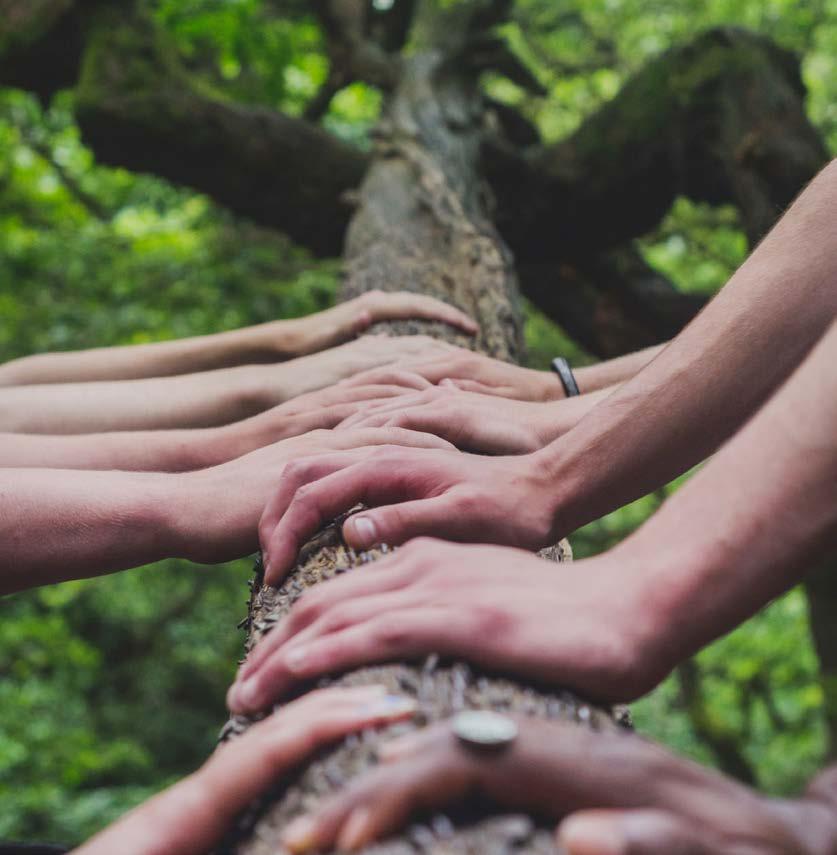
NEW MATERIAL AND INNOVATIVE PRODUCT DEVELOPMENTS
We aim to keep ourselves up-to-date and open to trying more responsible materials and production processes as they emerge. Testing and evaluating often takes several months and our Material Team strengthens this work. These are just a few new materials that we are evaluating and testing for our product ranges:
TENCELTM Lyocell
DESCRIPTION
TENCEL™ Lyocell is a manufactured cellulose fibre. It is commonly used in the textile industry due to its environmental benefits and smooth, soft feel that blends well with cotton and other natural fibres.
BENEFIT
TENCEL™ fibres are certified biodegradable in soil, water and marine environments. Compared to cotton, TENCEL™ Lyocell has a significantly lower environmental impact in terms of water, fertiliser and pesticide use. The raw material used to make the cellulose pulp comes from FSC™ certified wood. TENCEL™ Lyocell and TENCEL™ Lyocell blended with cotton can be chemically recycled after end-of-life.
APPLICATION AT NILORN
We use both pure TENCEL™ Lyocell and blended with cotton for woven and printed textile labels as well as ribbons and strings.
Partly plant-based heat transfer
Residue papers
Plant-based felt
DESCRIPTION
We offer a raised heat-transfer label that uses 30% plant-based content on the ink.
BENEFIT
Silica-gel ink is made with 30% non-GMO soy bean oil. The label is printed on a recycled plastic carrier.
APPLICATION AT NILORN
Partly plant-based heat transfer labels can replace standard transfers. Heat transfer is a popular method for integrated labelling of fabrics and other materials.
DESCRIPTION
Residue papers are a range of fashion papers made with industrial process residues. They use locally sourced waste fibres from different industries i.e. textile manufacturing or food processing to create high-quality papers with a special appearance.
BENEFIT
The paper production uses 100% renewable energy produced with hydroelectric. All papers are FSC™ certified and include 40% postconsumer recycled paper waste. Industrial process residue fibres replace 15% of tree pulp. The papers are recyclable with normal paper.
APPLICATION AT NILORN
The high-end look and feel of residue papers makes them an ideal choice for premium hang tags and packaging.
DESCRIPTION
Our plant-based felt is made with 70% waste cellulose and 30% PLA (polylactic acid) derived from corn. The cellulose fibres are collected in Austria from waste material derived from wood processing.
BENEFIT
The felt uses a high share of upcycled cellulose waste fibres. Both PLA and cellulose fibres are compostable.
APPLICATION AT NILORN
We use plant-based felt for patches and badges with a felt look. Typical finishes are hot embossing or embroidery.
Plant-based leather substitutes
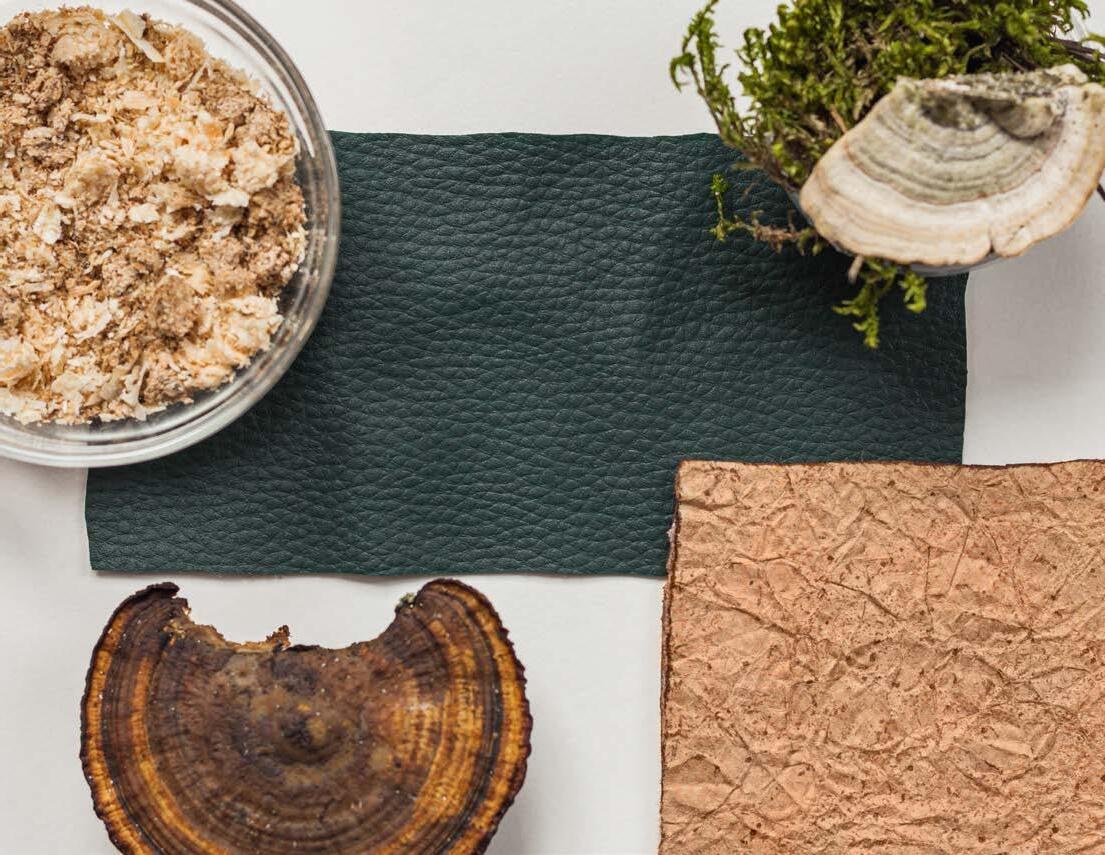
DESCRIPTION
We explore imitation leathers that are up to 100% plant-based and plastic free. They are mainly made with natural latex and cellulose and include waste fibres like agricultural residues.
BENEFIT
Plant-based leather substitutes can replace both real leather and fossil-based imitation leather and are vegan approved since no animal-based substances are used. The finished fabrics are plastic free; agricultural by-products are used as fillers, latex, pulp and fibres are FSC™ certified.
APPLICATION AT NILORN
These materials are used for badges and patches instead of leather and polyurethane.
"Our aim is to reduce our environmental impact by preferencing materials sourced, for example, from more regenerative and circular production systems."
Christina Heines Material and Innovation Specialist
VEGAN PRODUCT DEVELOPMENT
Veganism has entered the fashion world — from luxury to high street, active to casual — brands across the sector are offering capsule collections with veganapproved products. Nilorn supports the movement and we have designed and tested a development process for vegan-approved labels and trims.

SOURCING VEGAN ALTERNATIVES
When starting a vegan development, you need to understand that classing a product as vegan not only rules out using fur, leather, wool and natural silk (which comes from silkworms), but also many substances in glues, dyes, and chemicals derived from animals.
There is no legally binding definition for the requirements of vegan products. We have built the Nilorn Vegan Policy on learnings from the industry and how other brands approach their requirements.
We define a material or a product as vegan if it meets both of the following two conditions:
• The material or product does not contain any animal ingredients or by-products
• No animal ingredients or by-products are used during the product manufacturing
Vegan requirements typically apply to labels and trims. Metal and packaging, like hangtags, can be relevant depending on the project.
A Nilorn Vegan Approved product has gone through a stringent assessment by our suppliers, product development and compliance team working together to check and ensure compliance with vegan requirements.
IN SCOPE:
• Material is vegan: yarn, fabric, substances used to make the material
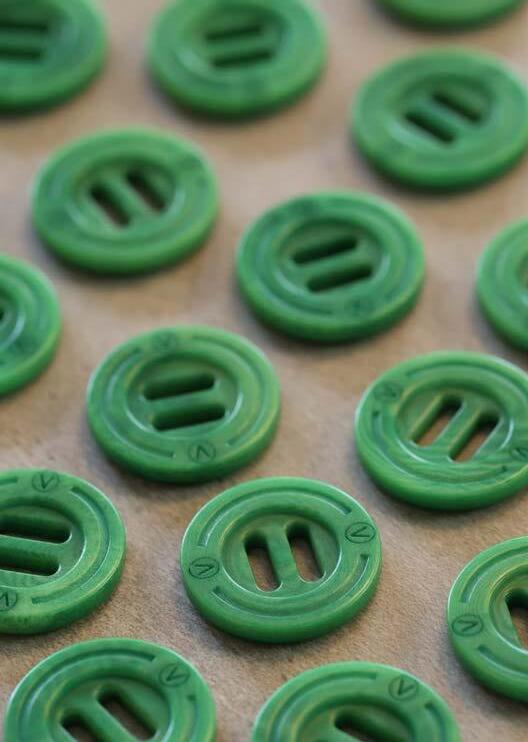
• Substances used during production and manufacturing are vegan: oils, finishes, dyes, glues, adhesives, ink, pigments etc.
OUT OF SCOPE:
• Raw material production
• Machine components and substances used for maintenance and cleaning
• Transport packaging
ARE ALL VEGAN PRODUCTS SUSTAINABLE?
Veganism is a philosophy and way of living that seeks to exclude all forms of exploitation of, and cruelty to, animals for food, clothing or any other purpose (The Vegan Society).
Vegan products do not necessarily have a production process without an impact on the environment. Likewise, vegan products are fair for animals, but not automatically fair for people. In an ideal world, veganism promotes the development and use of animal-free alternatives for the benefit of animals, humans and the environment. We aim to cover both areas — vegan requirements and responsible production.
"We have the tools and know-how to guide our clients through vegan product development for labels and trims."
Joe Mok Global Product Compliance Specialist
THE NILORN ROADMAP TO PREFERRED MATERIALS
Material offers benefits and challenges specific to its functionality and limitations. And for each material, we can evaluate and source responsibly produced alternatives. We consider these alternatives “preferred materials”. To provide guidance to alternative material sourcing, Nilorn’s Material Team has developed an internal roadmap: the Nilorn Preferred Materials Index (PMI).
THE NILORN MATERIALS STRATEGY – OUR VISION FOR CHOOSING PREFERRED FIBRES AND MATERIALS
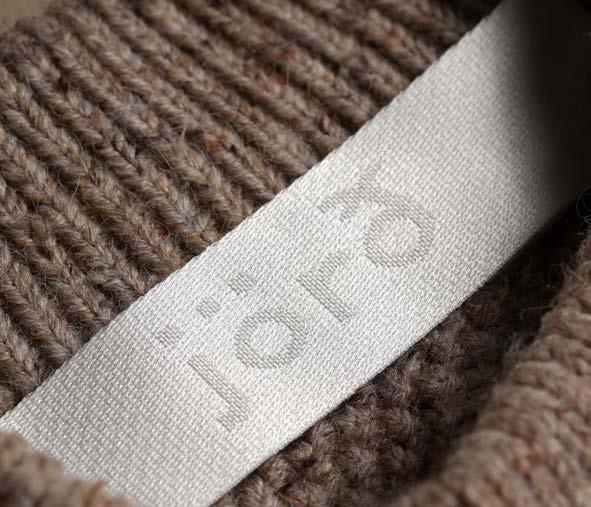
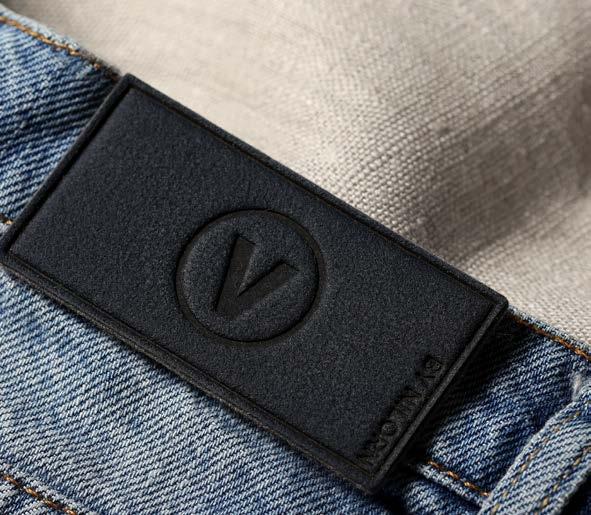
When it comes to raw materials our focus is on climate change mitigation and waste reduction. Our aim is to reduce our impact by preferencing materials sourced for example from more regenerative and circular production systems. Practically, this means our goal is to continuously increase the recycled content of our products and introduce biobased options instead of fossil-based materials wherever possible. We support material recycling and encourage the use of agricultural waste and food production residues as feedstock for biobased materials. We also support the use of renewable energy and see the huge benefit in tracing raw materials to their origin.
NILORN PREFERRED MATERIALS INDEX - A TOOL BASED ON CIRCULAR PRINCIPLES
The PMI reflects our vision for the fibres and materials we preference. It is guided by our Raw Materials Policy and supports our internal Materials Strategy. The index is based on circular principles and covers social, environmental and animal welfare:
• Material health and safety: Raw materials are safe for people and the environment at all use phases
• Renewable resources and energy: Fibres are derived from biobased and/or recycled sources, renewable energy is used for processing
• Material reutilisation: Products and fibres can potentially be reused and/or recycled after end of life
• Traceability and Transparency: Trace raw materials through the supply chain and back to its origin
• Water stewardship: Water is used in a socially equitable, environmentally sustainable and economically beneficial way
• Positive impact on people, animals and planet: Responsible use of land and soil to help ensure human rights and animal welfare
To build the framework we reviewed several industry sources: The Preferred Material Benchmark by Textile Exchange, the classification of the Higg Materials Sustainability Index (Higg MSI), the Cradle to Cradle Products Innovation Institute standards, Canopy Style’s annual Hot Button Ranking and findings from Sustainable Packaging Coalition resources for packaging materials.
The Nilorn Preferred Materials Index identifies levels of improvement: From conventional to improved, advanced and ultimately products we consider fit for the future.
GUIDANCE FOR NEW MATERIAL SOURCING
The Preferred Materials Index helps us rate and compare materials within the same category i.e. comparing conventional products with their more responsibly produced sibling. Each new material that we consider adding to our range goes through an initial funnelling process where we examine aspects such as functional properties, price level and availability together with its sustainability performance and end-of-life options. For example, compared to generic cellulose fibres, TENCEL™ branded lyocell fibres can be considered preferred since they are made from
certified wood and produced in a closed-loop system where 99% of the solvents and processed water are recovered and reused.
The PMI helps our sourcing and product development teams communicate our Material Strategy to our suppliers and source improved materials. Nilorn’s Material Team uses the tool to identify and evaluate high potential next generation materials for innovation developments. Shared with clients it can support more informed choices during material selection.
preferred fibre or raw material is one that delivers consistently reduced impacts and increased benefits for climate, nature, and people against the conventional equivalent, through a holistic approach to transforming production systems."
A LIVING SYSTEM
Working with materials is an ongoing process that requires a progressive approach. Our index is a living system that is regularly reviewed and adjusted by the Material Team. We will continue to evaluate available data, review and incorporate further potential data sources for future updates.
"A
Textile Exchange
ANIMAL WELFARE
For Nilorn and our clients, animal welfare is a high priority, so our choice of materials is guided by ensuring that animals in our supply chain are protected. In 2017, our first policy on raw materials with animal origin was published. From 2021, it was included in the Nilorn Supplier Handbook. We require that all our suppliers adhere to baseline requirements for the materials used in our products, and as we sometimes use materials of animal origin, we recognise our responsibility to protect animal welfare. All suppliers or companies subscribing to this policy must follow national and international legislation. Animal-based materials are only obtained as a by-product and not for the sole purpose of the slaughter of an animal and never from vulnerable or endangered species.
Nilorn participates in two initiatives run by the German Aid by Trade Foundation (AbTF) – The Good Cashmere Standard® and the standard Cotton made in Africa (CmiA) for sustainable cotton from Africa.
THE GOOD CASHMERE STANDARD® (GCS)
The Good Cashmere Standard® is an independent standard for sustainable cashmere, developed by the Aid by Trade Foundation (AbTF), that aims to improve the welfare of cashmere goats, the working conditions of farmers and to protect the environment. Developed in 2019 with respect to the Five Freedoms in close collaboration with animal welfare specialists and cashmere production experts, the standard aims to improve the well-being of cashmere goats, the working conditions of farmers, and their living environment. Before verification, each farm must complete a self-assessment, and farmers and cashmere
producers need to meet social, environmental and animal welfare criteria. Certificates are reviewed on an annual basis.
The standard focuses on cashmere production in Inner Mongolia, and in 2020 the first cashmere farmers were certified. In 2022, 12 cashmere producers with 9,400 farms and around 4.2 million goats participated in the verification process. The certificate authorises them to label their cashmere with The Good Cashmere Standard®. Partnering brands can then communicate to consumers that the cashmere wool used has been sustainably produced. Nilorn is proud to be a nominated producer of all standard labels.
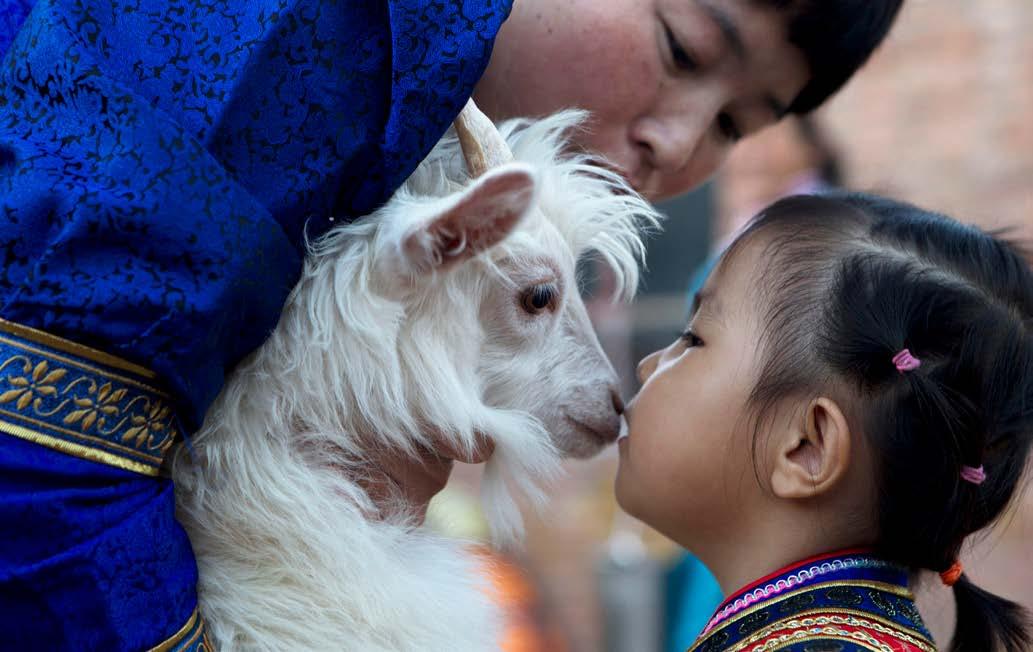
"It was a great opportunity for Nilorn to participate in the first Retail Summit arranged by GCS in Istanbul in 2022. Together with retailers and brands, we took part in discussions about sustainable cashmere, animal welfare and transparency in the cashmere supply chain, and we gained a better understanding of life on cashmere farms."
Simon Leppich, Managing Director Nilorn Germany Anna-Karin Wårfors, Sustainability Manager Nilorn Group
RECYCLED MATERIALS AND RECYCLING
Sourcing materials that are already recycled and that are easy to recycle again is a top priority in our journey towards circularity.
We believe that by using recycled materials in our products, we are involved in and drive demand for recycled material, which in turn can lead to better waste management and increased recycling rates. We see a growing interest from clients in recyclability. A common challenge for most brands and retailers in the global market is the differing availability of recycling. There are also both national and regional differences in recycling and waste systems, therefore, standardised and effective practices across the EU are needed to make product recycling easier.
GARMENT BAGS
In 2022, Nilorn joined the European Outdoor Group (EOG). Reducing packaging materials is a key area of interest for the group’s members and in 2018, they started a “Single Use Plastics Project”. The project investigates
alternatives to the common LDPE garment bag (often used to protect garments during transportation) and where the garment bag can be avoided. Our internal research is in line with EOG's findings, that recycled plastic is a superior packaging material in terms of technical performance and ecological impact along almost every single segment of its life cycle except at end-of-life since there is regional differences in recycling and waste systems. At Nilorn, we are developing garment bags in recycled LDPE using the project’s Poly Bag Standard with the aim of allowing used bags to re-enter the recycled material market through established polyethylene film recycling industry.
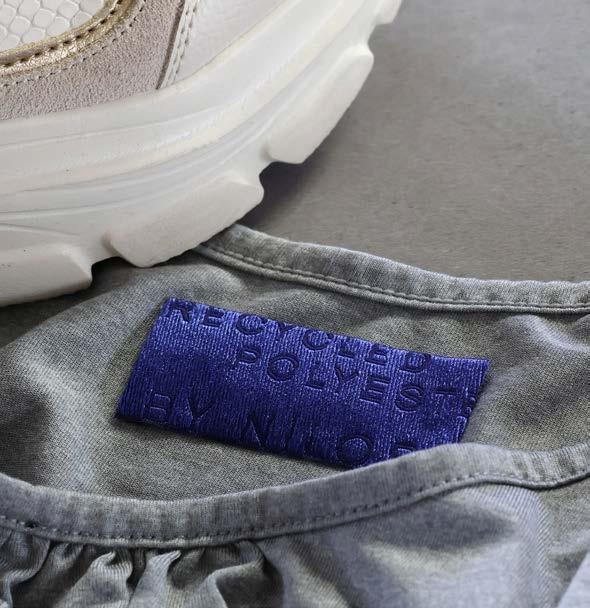
USING RECYCLED LDPE, PERSISTENT PLASTIC FILM
ADVANTAGE
• Good technical performance
• Reduction of plastic waste
• Recyclable monomaterial
• More widespread recycling infrastructure
• Widespread availability at Nilorn
CHALLENGE
• Still uses fossil-based material
• Problems with odor and colour
• Take a long time to decompose in nature
• Regional differences in plastic recycling
LABELS/ CERTIFICATE'S AVAILABLE
• GRS or RCS
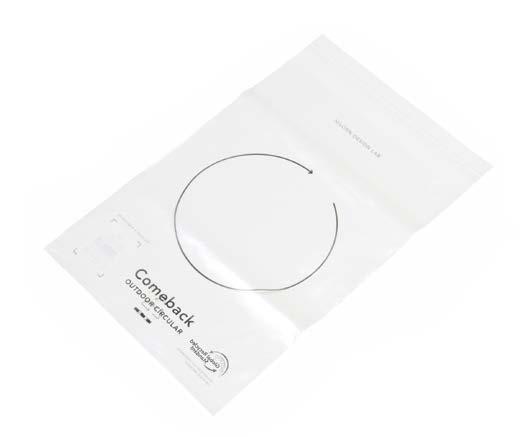
CONSIDERATIONS WHEN DESIGNING BIODEGRADABLE AND COMPOSTABLE PRODUCTS:
• In which natural environment is the product supposed to end up?
• Is a collection scheme for organic recycling available?
• Is the product linked to a brand’s take-back programme?
• Is certification needed to verify biodegradability claims?
• Consider communication and educating end-consumers about how to correctly dispose
BIODEGRADABLE AND COMPOSTABLE
Both biodegradable and compostable refer to the material’s end-of-life and can be beneficial in selected applications. All compostable material is biodegradable, but not all biodegradable material is compostable.
Biodegradable solutions for packaging – and now increasingly also for textile products – are of continuing interest to our clients. What does it mean for fashion and textiles and what is the impact on our industry? For which applications is biodegradability a valuable property and for which not?
BIODEGRADABLE
• Biodegradation is a natural process that happens in different environments
• The result is gases/CO2, water and minerals. Sometimes metal residue is left behind
• Time factor: Almost any product could be labelled ‘biodegradable’ because most things will break down at some point and given time
• Standard for biodegradability used by the EU: >90% of the original material must be converted into CO2, water and minerals by biological processes within six months
FOR PRODUCTS USED IN THE ENVIRONMENT, BIODEGRADATION MAKES SENSE
WHEN:
• Products (or their residues) are not collected
• Use of biodegradable material prevents micro-plastics from entering the environment
COMPOSTABLE
• Composting is a controlled, human-driven process
• The result is gases/CO2, water, heat and humus; no visible, distinguishable or toxic residue is left
• The materials or products biodegrade under specific conditions (heat, aeration, micro-organisms)
• Two routes for composting:
1) Industrial/commercial composting plants – a controlled environment with high temperatures up to 60°C, typically used for yard and kitchen waste collected by communities
2) Home/private garden compost – a changing environment and lower temperatures than industrial compost, typically used for yard and kitchen waste privately
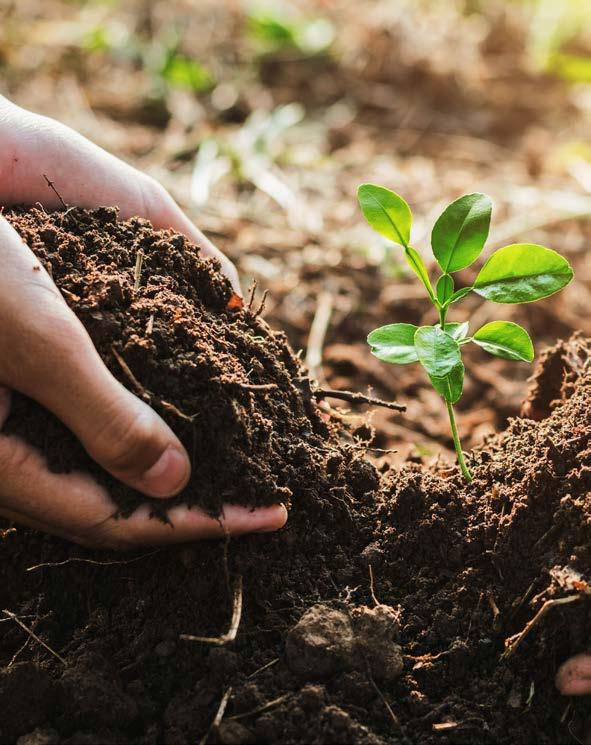
FOR PRODUCTS THAT END UP IN WASTE STREAMS, COMPOSTING MAKES SENSE WHEN:
• Products cannot be re-used or recycled
• Products cannot be separated from organic waste
• Compostable packaging is used to collect organic waste
SUSTAINABILITY STARTS AT THE DESIGN PHASE
Through our collections, we showcase to clients the range of products we can develop and deliver. Design teams in Europe develop the collections and they are presented twice a year. The interest in alternative materials is becoming increasingly important both for our clients and our own commitment to producing a more sustainable products. We see many possibilities for integrating better solutions with a lower environmental impact in the products we deliver. These options must be carefully evaluated to ensure we are making sound decisions.
DESIGNER’S CHECKLIST
Three principles guide our product development: reduce, recycle and rethink. The environmental impact of a product is largely dependent on the early stages of product development, where design is decisive. The checklist below has been prepared by our design department as a tool to guide the product development process.
We ask ourselves:
• Does the product serve its purpose and is it functional?
• Could we use recycled or certified materials?
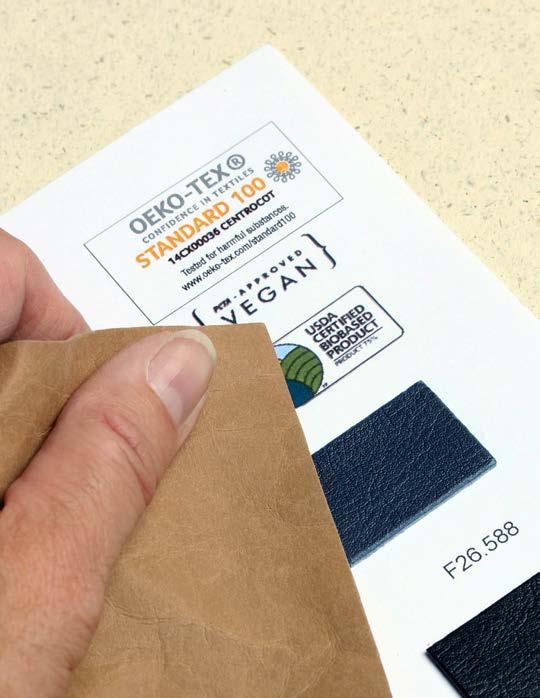
• Is the material suitable for the product?
• Will the item be easily recyclable?
• How can we reduce resource use and create less waste?
• Is longevity or reuse possible instead of single-use?
• Will it age with beauty?
Source: European Commission, Sustainable Product Policy
80% of a product’s environmental impact is determined at the design stage.
CIRCULARITY
Integrating circular practices is not only relevant to our clients, but also a way of thinking, designing and producing. We see it as a necessary transition to meet our internal goals to use materials that have a lower environmental impact and that can be recycled or reused.
Although labels, trims and packaging are only a small part of a garment, they can make a big impact. Providing the right trims is key to ensuring its cyclability. Labels encourage durability
by providing instructions on how to wash, dry and repair to minimise damage. Furthermore, clear instructions that remain visible on a label until a garment’s end of use help ensure recyclability.
Design and material choices play an integral role in creating products that can continuously be circulated back. Materials are broken down into two categories — biological and technical materials.
BIOLOGICAL MATERIALS
Biological materials come from renewable sources. They are natural materials like cotton, Tencel™ or viscose. They can either be recycled or safely decompose into the natural environment (soil, water, etc.) without affecting it in a negative way, providing food for bacteria and microbiological life.
TECHNICAL MATERIALS
Technical materials originate from nonrenewable resources. They are inorganic or synthetic and manufactured by humans — such as nylon, polyester, plastics and metals — when optimally recycled, they can be used many times without loss in quality, remaining in a continuous cycle.
If you want an easy way to find out about all our materials, standards and sustainability offer, take a look at our Blue Book, an easy-to-use guide to sustainability at Nilorn.The two material cycles in a circular fashion and textile industry
Tracebility and transparency

Traceability is one of the mechanisms that can be adapted to address issues such as the textile and apparel supply chain, product counterfeiting, inefficient recall practice and lack of visibility. Technology can enable traceability and transparency, and thanks to an effective traceability system, the story of the product can be seen and communicated.
HELPING OUR CUSTOMERS BECOME TRANSPARENT
Nilorn:Connect is our platform for digital services to help our customers become more transparent about their sustainability work. On it, we can create a digital twin of each physical product, allowing brands to collect and share extended and unique information about individual products. In a market where consumers are demanding greater transparency and legal regulations and requirements, such as the EU’s Digital Product Passport, are increasing,
brands that are ahead in this area will be at an advantage. This means brands need to have control and traceability of their products, like material composition, factories involved, working conditions, etc. Through Nilorn:Connect, we can help and encourage our customers to be accountable and transparent.





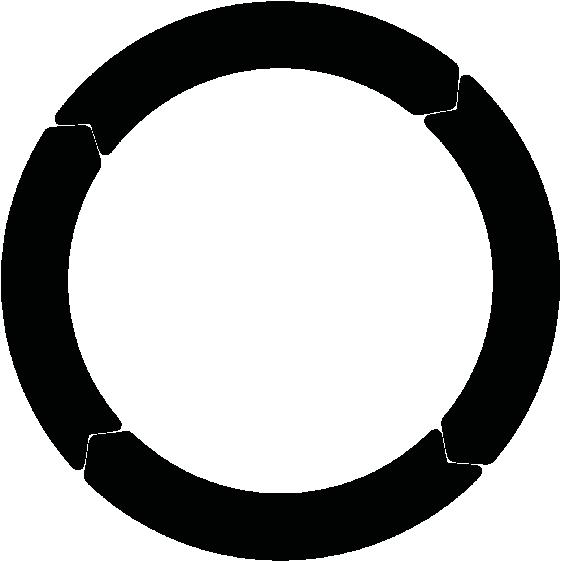
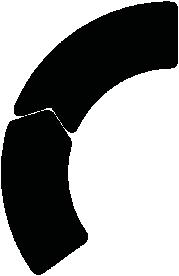
The experience when you scan a QR code or tap a NFC tag can be changed over time








DIGITAL PRODUCT PASSPORT
In March 2022, the European Commission presented its Ecodesign for Sustainable Products Regulation (ESPR) as part of the New Circular Economy Action Plan and Circular Economy Package. The proposed introduction of a Digital Product Passport (DPP) is expected to be a key enabler in promoting a circular economy.
The DPP facilitates collecting and sharing relevant data connected to a product with all actors during its life cycle. For example, consumers will have access to verified information about a product’s environmental impact, enabling them to compare products and make wiser purchasing decisions. The DPP will also contribute to the extension of the product user phase and improve the management of products in terms of sorting or recycling once reuse and repair are no longer an option. Textile products are one of the prioritised product groups. They are expected to be one of the first to have to put the upcoming obligations into practice, with a preliminary start date in 2024. (At the time of publishing, there was no decision on the final content or framework of the DPP or on the time plan for its implementation.)
DATA CARRIERS/LABELS
Unique QR codes are the most common way to label individual products, which consumers can scan via a mobile phone. NFC is another option but currently has a much higher price point and is, therefore, mainly used for exclusive and high-value products. QR codes can also be combined with RFID to support stock management and consumer interactions with a single label.
For unique QR codes, the recommendation is to use the GS1 Digital Link-standard with a sub-domain of the brand’s domain to avoid a solution vendor lock.
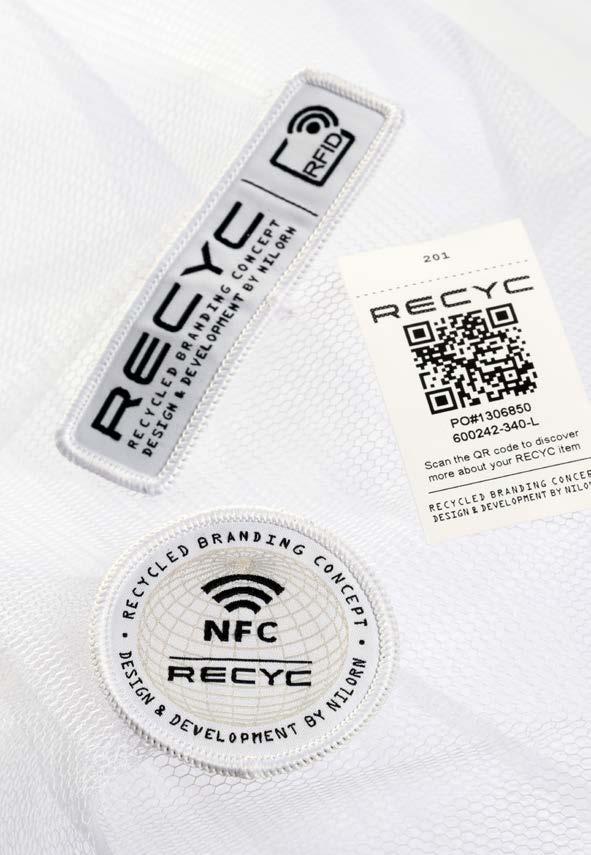
"We recommend to begin with our basic solution and grow with additional functionality and experiences from there. For brands already using barcode and care labels from Nilorn most, if not all, information is already available to easily get started."
Martin Arvidsson, Retail Information Systems business area manager
Quality management
Product quality is always first priority at Nilorn. In 2022, we updated our Quality Performance Standard (NQPS) and Restricted Substance List (NRSL) to align with the most updated regulatory and client requirements, and made it more fit for our purpose.
UPDATED STANDARDS
NRSL focuses on hazardous chemicals that may have an impact on the environment and the health of workers and end customers. These hazardous chemicals should be restricted in the finished product and in the manufacturing process. NRSL uses the AFIRM Restricted Substance List, chemical guidance from Research Institutes of Sweden’s (RISE) Chemical Group, as well as certain industry-specific requirements as guidance. Nilorn is a member of RISE Chemicals Group, a Swedish independent, state-owned research institute that exists to disseminate the latest findings related to chemicals and their potential impact on the environment and human health to its member companies. During the development of NRSL, we worked with researchers from RISE to review and discuss the content of the restricted chemicals list to ensure our standard covers all the necessary requirements and is practical as a tool for product compliance management. Currently, there are 37 groups of chemicals being monitored under NRSL.
NQPS focuses on the quality of our product during use. We classify the requirement by different product categories and prioritise using internationally recognised testing methods (i.e. ISO/EN standard) in our standard.
centralised database, we can easily check and trace back client’s quality requirements. It can also help ensure that client’s quality requirements are reviewed and verified during product development and production stages.

We realise that good information management is key to an effective quality management system. This year we have streamlined the workflow to manage the quality of documents from our clients. The objective is to create a unified workflow and set up a centralised database for quality requirements from clients. This new workflow creates more effective and efficient communications within our group where everybody can follow the same way of handling quality documents. With this
In addition to the client’s quality documents, we also created a third-party testing reports database in 2022. It is a centralised database within our Group for filing third-party test reports. This database can help us track back the past testing records easily. We can also extract testing data from the database for quality analysis to facilitate quality improvement and KPI setting. In 2022, over 400 test reports were uploaded to the database.
QUALITY CONTROL – QARMA INSPECTION PLATFORM
To cope with the increasing demands of product inspection capability due to the expansion in business volume and high ambition in quality, we started to use Qarma’s online inspection platform in 2021 to replace the old inspection system.
Qarma is our system for quality inspections and internal audits/supplier visits. We adopt Acceptable Quality Limit (AQL) sampling method in Qarma for product inspections. It is our quality control standard to accept/ reject goods based on the number of defects in an inspection lot. Suppliers can also carry out inspections online and a QC report with pictures will be generated and saved in Qarma.
The routine was implemented in Nilorn Shanghai, Hong Kong and Turkey in 2021. To roll out this platform globally in 2022, we completed training in Nilorn India, Bangladesh, Pakistan and Portugal. India and Portugal have already started using Qarma for inspection.
Nilorn Bangladesh has completed the trial and will officially implement Qarma in January 2023. We have also created a series of procedures and working documents to guide each office in implementing Qarma, which include:
• NQCGPS Nilorn Procedures and Standards of inspection – a working procedure to guide QC on how to carry out routine product inspections
• NQCGIP Nilorn QC General Inspection Protocol – an inspection standard to specify the inspection parameters, inspection methods, and defect classifications for each product category

• Qarma inspection rate guidance – a guideline for determining the inspection rate for different product categories/suppliers by risk-based approach
In 2022, over 27,000 inspection reports were generated, on average, 2,300 per month.
GHG EMISSIONS
Today, air transport is often used to meet client deadlines, but we believe that through better awareness and dialogue with clients, we can reduce the share of air transport and use it only for urgent time requirements. In 2022, we initiated a Life Cycle Assessment (LCA) project aimed at better understanding the impact of our products, materials used and transport emissions. Read more about the LCA on page 42 and emissions reporting on page 68.
Our approach to Focus area 2. SUPPLY CHAIN
TARGET 2025
STATUS 2022
MOST MATERIAL SUSTAINABILITY TOPICS
100% certified claim paper, of which 80% is FSC™.
100% recycled polyester.
55% are certified claim paper, of which 50% is FSC™ certified.
Engaging in a meaningful way with our entire supply chain is essential to ensuring that both our company and our suppliers hold the highest standards in labour, human rights and environmental matters.
100% recycled polyester in weft and warp is available in all our production markets.
55% of all delivered polyester labels was in recycled polyester.
Biodiversity and ecosystems
GHG emissions
Materials
100% of Nilorn internal design collections in preferred materials.
Map our supply chain back to raw material level enabling full supply chain traceability.
The advantage of a global supply chain and multiple locations are shorter delivery times, lower freight costs and reduced environmental impact. Yet, we also recognise the challenges associated with such a supply chain. Nilorn combines its own production with external suppliers that manufacture and deliver key components of our offer. As a result, we can be more flexible and adapt to various locations, which represents a strong added value for our clients. But this also comes with the responsibility to collaborate with our partners and ensure responsible
TARGET 2025
100% of preferred suppliers social and environmental audited
business practices, including adequate labour conditions and respect for human rights.
85% of the design collections represent a more product.
Initiated but not completed, dependent on the implementation of common ERP system.
We aim to ensure that we use all the resources required for our business in an efficient way, whether it is water, waste, energy or transport. We are also committed to ensuring that our suppliers provide their own employees with the highest labour standards. This can only be achieved by collaborating with our business partners to collectively achieve the global goals.
Product development
Resource efficiency (energy, waste, water)
Diversity, equality and inclusion
Economic development
Health and safety
Human rights
Local communities
STATUS 2022
91% of purchase volume in risk countries is with a SMETA or similar audited supplier.
100% of preferred suppliers sign General Agreement and Supplier Handbook, including anti-corruption policy Signed by 92%.
100% of wastewater returned to the environment safely
50% of preferred suppliers energy is from renewable sources
Map our supply chain back to raw material level enabling full supply-chain traceability
In 2023 water use in supply chain will be included in our reporting.
In 2023 energy use in supply chain will be included in our reporting.
Project started.
Ethical business and anti-corruption
Knowledge sharing
Product development
Resource efficiency
Nilorn is committed to optimising the use of resources, minimising waste and ensuring that materials and products comply with our own and our stakeholders’ standards. We focus on reducing climate impact across the value chain, and as the majority of our products are produced by external suppliers, a major part of our impact is in the supply chain. So far, our main work with resource efficiency has been concentrated on our own production, read more about this on page 57. However, since implementing the Higg FEM with external production, we continue to get a better understanding of how to reduce negative impacts. A better knowledge of the supply chain helps us to share good practice and actions taken to reduce resource use.
LIFE CYCLE ASSESSMENT (LCA)
To gain a better understanding of the environmental impact of our products, we conducted an LCA screening of the product group Care Labels with a cradle-to-grave scope. The screening LCA was done by Miljögiraff, a Swedish environmental consultant specialising in LCAs and ecodesign.
OUR FINDINGS
While doing the LCA for a recycled polyester label, we found certain hotspots. Climate change is the environmental impact category most negatively impacted by care label production. Energy consumption has the highest impact in all life-cycle stages, and the most impact occurs when producing raw materials.
LIFE-CYCLE STAGES OF THE STUDIED CARE LABEL
In total, 1 m2 Care label causes climate change by emitting 1,37 kg CO2 eq throughout its life cycle.
ENERGY
The LCA presented above stresses the importance of moving towards more renewable energy in production. We have a few suppliers that are already using renewable energy, however, it is limited. This is something we will focus on in 2023, both to understand the current situation and to share knowledge on how to access alternatives.
WASTE
If waste from production is not disposed of correctly, it can pollute and contaminate the environment and surrounding communities. Waste performance can be improved both by disposal methods like recycling and reuse and by reducing the amount of waste generated.
WATER
There are processes in our supply chain, like dying, that are waterintensive and as part of the textile industry, we need to be mindful of water use. Some of our suppliers operate in areas with high water stress and several of our suppliers conduct an assessment using the WWF Water Risk Filter. In 2023, we will start measuring water consumption in our supply chain.
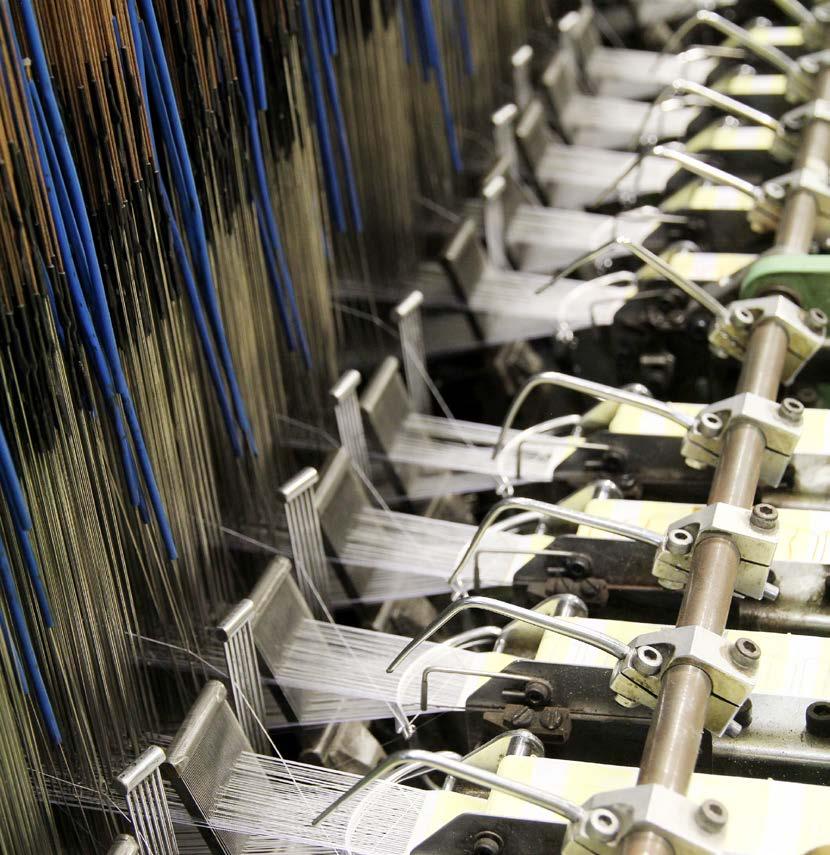
Responsible sourcing
SUPPLIER GOVERNANCE
Our goal is to have a fully compliant supply chain and proactively ensure our suppliers adhere to the same high standards we do to achieve a more sustainable end product. We conduct a variety of CSR-related activities and urge suppliers to do the same.
Most of our first-tier suppliers are in Asia and Europe and we actively work with them to ensure they commit to all aspects of a sustainable business, from sourcing materials to offering employees a safe working environment. They are expected to keep accurate information regarding their
activities, structure and performance and disclose these in accordance with applicable regulations and industry benchmark practices. Business partners should neither participate in falsifying such information nor in any act of misrepresentation. Monitoring suppliers across a nationwide or global supply chain can be difficult, but we aim to ensure that our suppliers protect human rights, provide safe workplaces and reduce their environmental impact.
There are regular supplier meetings as a channel to communicate our standards and expectations to suppliers. It also serves as an interactive channel for suppliers to raise their concerns and seek guidelines and support from Nilorn.
It is important for us to continue reducing our supply chain for greater control, visibility, improved communication and buying power. Whilst reducing our supply chain, we also build relationships with existing suppliers, some of which we have been working with for over 20 years.
NILORN SUPPLIER CODE OF CONDUCT
Our Supplier Code of Conduct is part of the agreement and serves as a common foundation for us and our suppliers in terms of acting in a responsible manner, including focusing on social responsibility and good working conditions. The Supplier Code of Conduct requirements are based on the ETI Base Code. The ETI Base Code is founded on the conventions of the International Labour Organisation (ILO) and is an internationally recognised code of labour practice.
This Code of Conduct is mandatory for all suppliers, their subcontractors and other business partners that do business with Nilorn. Companies applying this code are also expected to comply with national and other applicable laws, the provisions of this code constitute minimum and not maximum standards.
THE ETI BASE CODE IS BUILT AROUND NINE PRINCIPLES
• Employment is freely chosen
• Freedom of association
• Working conditions are safe and hygienic
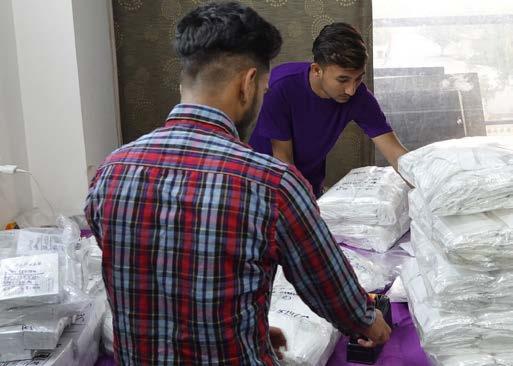
• Child labour shall not be used
• Living wages are paid
• Working hours are not excessive
• No discrimination is practised
• Regular employment is provided
• No harsh or inhumane treatment is allowed
Number of suppliers 2022 196 (229*)
* Previous year
SUPPLIER ONBOARDING
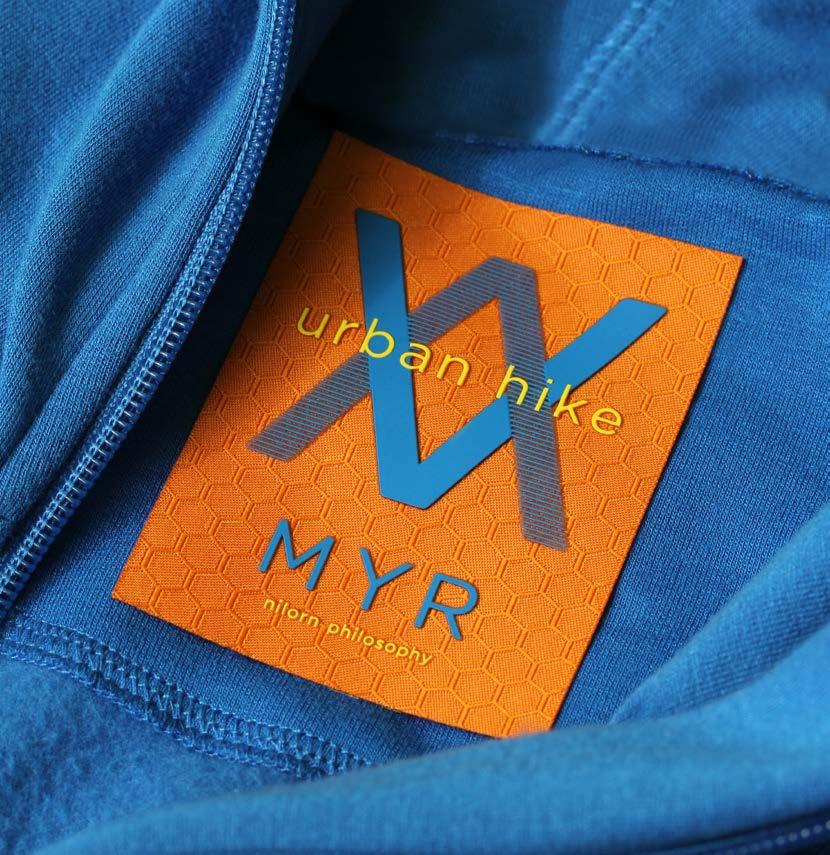
New suppliers are reviewed by the CSR department and the ‘Nilorn New Vendor Guideline’ must be followed. The first assessment includes checking social audits the factory may previously have been subjected to together with environmental information through Higg FEM and other areas such as production capacity and product quality. New suppliers should preferably be visited prior to production; however, due to travel restrictions the last three years, we had to depend more on self-assessments rather than third-party audits, but we also developed a digital audit tool (see page 46). Contractual agreements are entered into with suppliers, including their commitment to abide by Nilorn policies and guidelines.
Total number of new suppliers assessed in 2022 according to both social and environmental criteria: 24 (80% of all new suppliers).
In 2022, four business relationships were terminated after a dialogue with involved suppliers, due to not meeting the required compliance level.
In 2022, the Nilorn supplier presentation was updated to cover more areas. The presentation shows Nilorn’s ambition in CSR and sustainability to communicate the way we work and what our clients can expect from us and our supply chain. It is available in five languages to be broadly accessible.
THE SUPPLIER HANDBOOK
The Nilorn Supplier Handbook is part of a package for all new suppliers, and it covers:
- Ethical Business Practices
- Nilorn’s Code of Conduct and other requirements of social compliance
- Chemical Management and Product Safety – Nilorn’s requirement on RSL, ZDHC, REACH, and other chemical regulations
- Quality and Testing – quality requirements and testing routines
- Product Development and Production Guidelines
– development, production, delivery and packing guidelines
RISK ASSESSMENT
Risk-scoping is conducted mainly through the Sedex risk-assessment tool Radar. The scoping is done twice annually to identify any new reoccurring risks based on the global situation.
The Nilorn country risk matrix is collectively based on:
- Sedex Radar Tool
- BSCI Risk Classification
- Trade organisations news updated on new risks in supply-chain impacting our industry
- Nilorn Vendor Rating
- Third-party social audits
- Nilorn supplier visits
SUPPLIER INSPECTIONS AND ONGOING MONITORING
We carry out internal inspections in combination with thirdparty audits through BSCI, Sedex and other initiatives. Most importantly, we focus on having close dialogue and frequent meetings with all prioritised suppliers. We carry out supplier visits both virtually and on site and we have implemented a digital tool to support the inspection process. It facilitates planning, follow up and administration.
OUR WAY OF CONDUCTING VIRTUAL AUDITS
Due to travel restrictions and to minimise our carbon emissions, we have implemented more virtual supplier checking. Below is the procedure that is followed.
Before audit
1. Inform the supplier
2. Agreed date and share the Nilorn Supplier Visit Checklist with the supplier
3. The supplier shares the required documents
4. Prior to audit, Nilorn CSR team reviews the documents and prepares the audit
During virtual audit
1. Opening online meeting
2. Show and present the Nilorn Supplier presentation
3. Ask questions in audit report that have not been answered or filled out yet
4. Virtual facility check. Local Nilorn representative will support, if present on site
5. If no local representative, we will ask the supplier to facilitate the walk around. Make stops at the places that require an image to be added in the visit report
6. Document checking
7. Closure meeting and questions
After audit
In 2022, we were able to visit and present at many of our suppliers. Our supplier presentation gave the suppliers a better understanding of Nilorn, our goals requirements and targets. We also see it as an opportunity to educate and point out areas of improvement at the facility. By meeting and connecting with our suppliers we build stronger relationships and partnerships.
2022 IN NUMBERS
73 internal inspections including social and environmental assessments (61 onsite visits, 12 virtual audits)
62 third-party audits
1. Nilorn CSR team finalise audit report
2. Share audit report with supplier and make comments regarding any observations
3. If any Red or Yellow NCs, send out a corrective action through the Qarma app, with a deadline for the supplier to complete
4. Check CAP deadline and follow up if corrected
5. Based on the audit results a date/year for the next audit will be decided
SEDEX
For Nilorn, Sedex supports the management of our complex supply chain and allows us to share data with clients. We are an A/B-member (buyer/supplier).
Sedex, Supplier Ethical Data Exchange, is a non-profit membership organisation and online database used by more than 74,000 members in over 170 countries, which allows companies to store and view data on ethical and responsible business practices. Members also have access to a range of resources and reports, including industry-specific questionnaires and risk analysis tools. Sedex does not set any standards or determine the policy of its members. Sedex provides a place to store all ethical audit reports, with a summary of non-compliances held in a common format. Since all social audits, such as BSCI, SA8000 and ICTI, can be uploaded to the Sedex platform, it also reduces administration.
The Sedex Members Ethical Trade Audit (SMETA) is a common audit methodology and report format aiming to drive consistency of data from the auditing process. SMETA is the world’s most used ethical audit format. The audit checks specifically against the ETI base code and how it is distributed to employees and the supply chain, relevant local laws, environmental performance, subcontractors/home workers, eligibility to work and understanding the ETI base code.
We continue to engage more of our external supply chain in Sedex and now more than 91% of our buying volume in risk-classified countries is third-party audited. Small suppliers can be a challenge, with bespoke products that are not part of the core business. However, our program to reduce the number of suppliers will also support our goal of 100% third-party audits by 2025.
THE STEPS IN A SMETA AUDIT
1. Submit a self-evaluation form
All sites that are to be audited are required to complete a self-evaluation form prior to the audit.
2. Conduct a Sedex audit on site
Auditors check if the social and environmental management documentation meets the SMETA criteria. The duration of any given audit depends on the number of employees and locations.
3. Issue a report and CAPR
Once the Sedex audit is done, a corrective action plan is created together with a detailed audit report (SMETA Report & CAPR), these can be uploaded to the Sedex database.

HIGG INDEX
The Higg Index was developed by the Sustainable Apparel Coalition (SAC) in 2012. It has now grown to become the leading module to measure brands’, retailers’, and facilities’ environmental and social impact and performance. The modules use a scoring system based on self-assessment and verification. The Higg Index provides a holistic overview that empowers businesses to make meaningful improvements to protect the well-being of factory workers, local communities, and the environment. It also enables and encourages the industry to become transparent by communicating sustainability information publicly.
Higg has three tools for different types of businesses: Product, Facility and Brand & Retail tools. We work with the facility tools, while several of our clients use the Brand & Retail tools. The Higg Facility Tools offer yearly social and environmental assessments that facilitate conversations among value chain partners to improve socially and environmentally at every tier in the global value chain. Within the facility module we work with the Higg Facility Environment Module (FEM) and the Higg Facility Social Labour Module (FSLM).
The FEM module supplies information about the environmental performance of individual facilities, empowering them to scale improvements. The Higg FEM assessment tool standardizes how facilities measure,
SUPPLIER EVALUATION AND VENDOR RATING
evaluate and improve their performance every year, providing facilities with a clear picture of their impacts.
In 2022, we continued to include more external production units and include 77% of our purchase spent in 2022. By working with the Higg Index and the measurable data, we have a tool to set objectives that can be followed up and for our clients that also use Higg, we can easily share data in the platform.
THE HIGG FEM ASSESSES THE FOLLOWING:
• Environmental Management Systems
• Energy
• Water
• Wastewater
• Air Emissions
• Waste
• Chemicals
THE HIGG FSLM ASSESSES THE FOLLOWING:
• Recruitment and Hiring
• Working Hours
• Wages and Benefits
• Employee Treatment
• Employee Involvement
• Health and Safety
• Termination and Retrenchment
• Management Systems
• Above and beyond
All our preferred suppliers are evaluated annually. Topics evaluated include delivery reliability, product quality, service, product development, economy and environmental approach. Third-party standard certifications, together with site visits, are normally part of this evaluation process. The supplier is graded per the evaluation, and, if necessary, an action plan is developed for improvements. The evaluation is used for follow-up activities, such as supplier training and development.
As a part of our continuous work in developing and increasing the standard of our supply chain, a Vendor Rating was introduced in 2021. The Vendor Rating is a tool connected to our business system Microsoft Dynamics NAV for categorising suppliers. It gives an overview of all suppliers and the possibility to categorise suppliers using an internal rating. There are ten criteria included in the rating and for each criterion achieved the score increases. At this initial step we focus on soft criteria, for example, third-party social audit status, Higg Index involvement and Nilorn site visit reports. The total score is converted to a letter from A-D, where A is the highest rating. The tool will support us in tracking and improving supplier performance and this is communicated internally to our purchase organisation when placing orders. This is beneficial for both our suppliers and us, as we strive towards working with higher-rated suppliers and it pushes suppliers to strive for the highest rating. We have started work on adding “hard-criteria” to the vendor rating, e.g. delivery reliability and partial deliveries, and this will be finalised in 2023.
Human rights
Nilorn’s approach to human rights is based on UN Guiding Principles on Businesses and Human Rights and the “Protect, Respect and Remedy” framework. As a globally operating company we recognise our responsibility to respect international standards and practices, such as those of the United Nations (UN) Universal Declaration of Human Rights and Fundamental Rights at Work by the International Labour Organisation (ILO). Our commitment to operating with respect for Human Rights is reflected in company policies and procedures and Nilorn is a signatory of the UN Global Compact.
We seek to play an active role in the promotion of Human Rights and to work proactively to respect the rights that all people are entitled to basic rights and freedoms, regardless of nationality, gender, religion, race, or any other status. Nilorn aim to avoid causing or contributing to adverse human rights impacts in areas which we can directly influence, through our management control and addressing such impacts if they occur. Wherever possible, we also strive to identify, prevent, or mitigate adverse indirect human rights impacts that may be linked to our
operations, products, and services through business relationships. Nilorn has zero tolerance for slavery and human trafficking.
Discrimination, the importance of diversity and the need for equal access to opportunities are risk areas in complex supply chains. By identifying and mapping supplier's sites against known risks, awareness can be raised and actions planned.
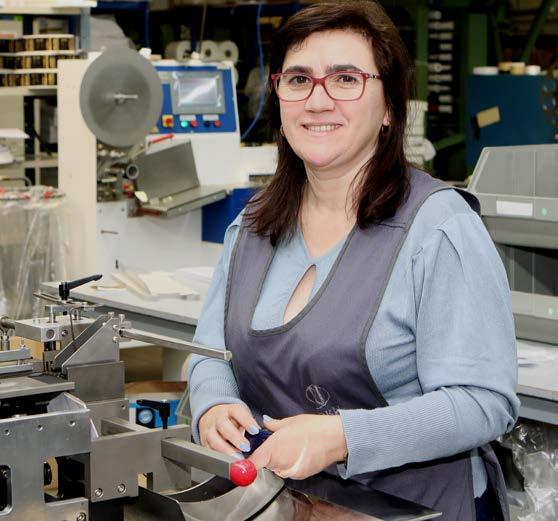
MODERN SLAVERY
Modern slavery is a term that captures a range of human rights issues, including forced labour, bonded labour, human trafficking and child slavery. Since 2017, Nilorn has published a statement in line with the UK Modern Slavery Act 2015, detailing the steps we take to ensure that modern slavery and human trafficking are not taking place in our operations and in the supply chain. The statement is published on the Nilorn website. It reflects our zero-tolerance approach to modern slavery in every form, and the different forms of modern slavery are covered by the focus areas of our supply chain audits. Employees or third parties who identify a potential or actual violation of these commitments or requirements are encouraged to file an anonymous report to our whistleblowing tool.
HUMAN RIGHTS DUE DILIGENCE PROCEDURE
The Human Rights Due Diligence procedure (HRDDP) is part of Nilorn’s responsible business practices and functions as a base and structure for the CSR (Corporate Social Responsibility) work at the company. The HRDDP aims to assure that human rights are not violated and includes routines for building internal awareness and understanding of where the company’s activities may have the potential to intersect with human rights or infringe upon the enjoyment of human rights by others, as well as how to prevent or mitigate such potential human rights impacts and remediate actual impacts that have occurred.
Nilorn seeks to do business with suppliers who share similar values and respect human rights. We require our suppliers to take actions that are consistent with the Nilorn Supplier Code of Conduct. Suppliers are required to have processes in place to ensure that they do not take part in human trafficking or modern slavery.
By signing the UN Global Compact, we commit ourselves to continually improving our practices and to comply with laws and regulations and acting in accordance with commonly accepted best practices.
The procedure follows the OECD 6-step Due Diligence Guidance for Responsible Business Conduct:
1. Embed responsible business conduct
Our policies include a commitment to respect human rights
• Human Rights Statement
• Corporate Responsibility and Sustainability Policy
• Supplier Code of Conduct
• Homeworkers policy
• Supplier Handbook
• Slavery and Human Trafficking Statement
• Anti-Corruption and Bribery Policy
• Gender Equality Policy
• Anti-Harassment and Bullying Policy
• Public Interest Disclosure “Whistleblowing” Policy
2. Identify & access adverse impacts
We use due diligence to identify and address human rights challenges. To support this process, we introduced a due diligence toolkit including:
• Collecting supply chain information (agreements, audit reports, certifications, licenses & permits, etc.)
• Evaluating and revising supply chain information
• Risk assessment & identification
3. Cease, prevent or mitigate
• Third-party social audits, with follow up and tracking of any issues that might have occurred
• Supplier visits done internally by Nilorn
• Training internally and for suppliers
5. Communicate
We communicate internally and externally on expectations to manage and mitigate human rights risks in our business operations and supply chains. Examples are:
• Sustainability report
• Vendor Rating
• Webpage
• Policies
• Grievance and remediation systems
6. Provide for or cooperate
Working together with the industry to prevent or mitigate issues. Examples of organisations Nilorn participates in:
• AAFA
• European Outdoor Group
• TEKO
4. Track Tracking of the information and documentation is done through the different company systems and cooperation platforms, as Microsoft Dynamics NAV, Sedex, Higg and Qarma. Record keeping and continuous follow up.
• Sedex
• HIGG
Product development
CHEMICAL MANAGEMENT
Nilorn produces a range of products in varied materials at our six production sites and through external production. The manufacture of products requires the use of chemicals, especially dyeing and printing processes. A good chemical management system is essential to drive responsible chemical control at manufacturing facilities to ensure worker safety, reduce environmental impact, and ensure finished products comply with all relevant regulatory and client’s quality standards. Our chemical management does not only focus on the restricted chemicals that may be present in the finished product, we also monitor the hazardous substances that are present in the process chemical, even though they will not be remain in the finished product. In our updated NRSL, we require the chemical formulation used in the production process to comply with the current version of ZDHC MRSL (Zero Discharge of Hazardous Chemicals Manufacturing Restricted Substances List).
"NO TO PFAS"
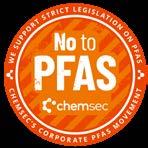
PFAS is one of the hottest topics in the industry. More and more regulations related to PFAS are being implemented worldwide. PFAS are commonly used in the textile value chain to achieve desired properties like oil, water, stain, and grease resistance. When used, they are easily discharged into the environment, contaminating groundwater and soil. Several PFAS substances have proven to be carcinogenic, toxic, harmful for foetuses and can disrupt the body’s endocrine, or hormonal, system.
Nilorn is part of ChemSec’s corporate PFAS Movement. We started the “No to PFAS” project in 2021 to conduct a survey with our suppliers in China, India, Italy, and Turkey. On-site audits were also conducted at two of the largest production units. The conclusion is that PFAS have not been detected or found in any Nilorn products. To follow up on this project we conducted PFAS testing in two production sites in early 2022. The focus was on recycled paper and paper products with lamination and
printing. No PFAS was detected in either material. Based on the supplier survey, factory verification as well as the spot-checking test result, we conclude that our product does not have a high risk of containing PFAS. Going forward we will focus on products with grease/waterrepellent properties, which are considered high-risk.
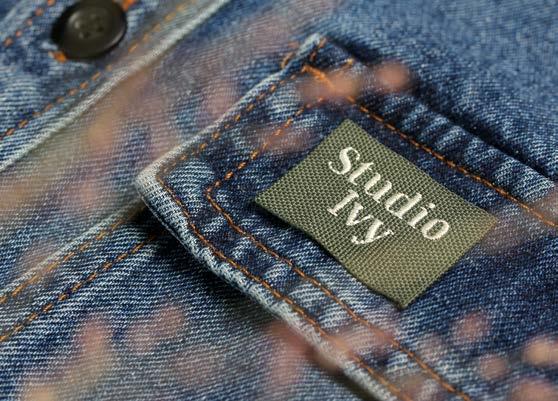
REGULATIONS

As many of our clients act on a global market, there are several regulations to consider in production, REACH and California Proposition 65 being two of them.
REACH
REACH, Registration, Evaluation, Authorisation and Restriction of Chemicals, is an EU regulation adopted to improve the protection of human health and the environment from risks posed by chemicals while enhancing the competitiveness of the EU chemicals industry. It also promotes alternative methods for the hazard assessment of substances to reduce the number of tests on animals. In general, REACH applies to all products including apparel and textiles products.
It is the responsibility of all manufacturers, importers and users of substances within the EU to ensure that the substances they manufacture, import or use do not pose any risk to human health and the environment. REACH affects all EU actors that professionally manufacture, import, sell, buy, distribute, or use chemicals as they are or in products. It is an obligation to the manufacturers and importers of articles to notify their customers that the present of any Substances of Very High Concern (SVHC) in the product exceeds the limit. There is also a list of restricted substance in the REACH regulation Annex XVII. Our membership in the Swedish Chemicals Group helps us stay up to date with the regulation. In response to the
amendment of Annex XVII entry 68 regarding C9 – C14 PFCA and their salt which will be implemented in 2023, we have included this chemical group in our updated NRSL, and they are not allowed to be used in our products.
CALIFORNIA PROPOSITION 65
California’s Proposition 65 (Prop 65) is the Safe Drinking Water and Toxic Enforcement Act of 1986. It was enacted with the intention of educating Californian consumers about the risks to which they may be exposed by purchasing certain products. The Proposition 65 list is a list of chemicals that the state of California believes can cause cancer, birth defects, or other reproductive harm if consumers are exposed. The list is updated at least once a year and currently regulates more than 900 chemicals. It requires businesses to provide warnings to Californians about significant exposures to the listed chemicals and it prohibits Californian businesses from knowingly discharging significant amounts of listed chemicals into sources of drinking water. Through our membership in AAFA, we get valuable information about the status of Prop 65. In 2022, the Office of Environmental Health Hazard Assessment of California (OEHHA) added perfluorooctanoic acid (PFOA) to the Proposition 65 list, which is known to the State of California to cause cancer. This chemical is already included and restricted in our current NRSL.
Biodiversity
Nature is critical to meeting the Sustainable Development Goals. Biodiversity is a complex issue with many dimensions, for Nilorn we have an impact through the materials we use, and the surroundings of our own production sites but also the supply chain and biodiversity-related human rights impacts, such as local communities and workers.
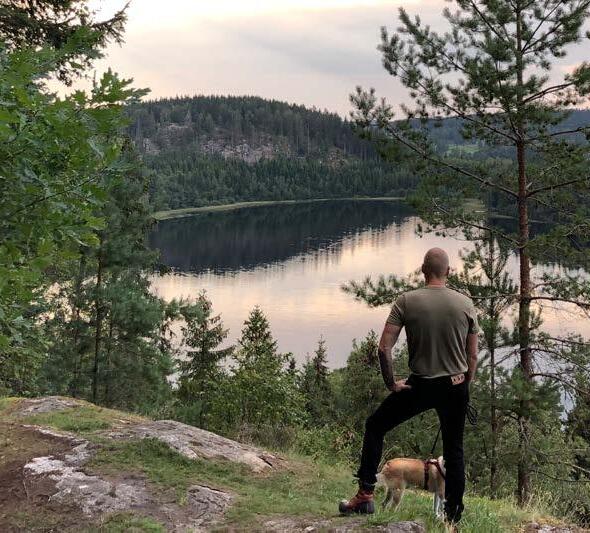
Raw materials critical to biodiversity in our supply chain include timber and cotton. Cotton production consumes a lot of water, for example, and deforestation is a threat to biodiversity. Moving towards more circular business by, for example, reducing use of virgin materials and allowing
a recycling option or eliminating unnecessary plastic packaging waste and design for reuse, can reduce the negative impact. In 2023, we will further investigate how we can assess biodiversity impacts and obtain supply chain data, including how to measure and follow up.
The UN Convention on Biological Diversity (CBD) defines biodiversity as “the variability among living organisms from all sources including, inter alia, terrestrial, marine, and other aquatic ecosystems and the ecological complexes of which they are part; this includes diversity within species, between species, and of ecosystems.”
The Global Biodiversity Framework (GBF) was adopted at COP 15 2022. The GBF consists of four overarching global goals to protect nature, including:
halting human-induced extinction of threatened species and reducing the rate of extinction of all species tenfold by 2050;
sustainable use and management of biodiversity to ensure that nature’s contributions to people are valued, maintained and enhanced;
fair sharing of the benefits from the utilization of genetic resources, and digital sequence information on genetic resources;
and that adequate means of implementing the GBF be accessible to all Parties, particularly Least Developed Countries and Small Island Developing States.
TARGET 2025
STATUS 2022
100% of preferred suppliers social and environmental audited
100% of preferred suppliers sign General Agreement and Supplier Handbook, including anti-corruption policy.
91% of purchase volume in risk countries is with a SMETA or similar audited supplier.
Signed by 92%.
Our approach to Focus area 3. NILORN OWN OPERATIONS
100% of wastewater returned to the environment safely. In 2023 water use in supply chain will be included in our reporting.
Competent and committed employees form the basis for Nilorn to be innovative and competitive. We work responsibly for the well-being of both our employees and the environment.
50% of preferred suppliers energy is from renewable sources. In 2023 energy use in supply chain will be included in our reporting.
Map our supply chain back to raw material level enabling full supply-chain traceability.
The company strives to offer a workplace characterised by diversity where employees can reach their full potential and contribute to developing a high-performing organisation.
By ensuring diverse and equal opportunities at Nilorn, we aim to provide a workplace where all our employees feel welcome and cherished, regardless of their gender identity, sexual orientation, ethnicity, faith or background.
Project started.
Moreover, our employees’ physical and psychosocial health and safety are a cornerstone to conducting our business responsibly and ethically. We also focus on upholding our business ethics, guiding co-workers to behave accordingly, and nurturing diversity at our offices, from the very beginning of the recruitment processes to our employees’ growth and promotion.
MOST MATERIAL SUSTAINABILITY TOPICS
Biodiversity and ecosystems
GHG emissions
Materials
Product development
Resource efficiency (energy, waste, water)
Diversity, equality and inclusion
Economic development
Health and safety
100% units offering a program for employee community engagement
40-60% gender balance in our units
Zero tolerance for corruption
100% SMETA audited (Sedex).
100% landfill-free
100% renewable energy
100% of waste water from our operations returned to the environment safely
Our program together with WaterAid, includes all Group employees.
We currently have a 43% female and 57% male gender split.
No incidents reported 2022.
Nilorn Bangladesh, Hong Kong, Portugal, Shanghai and Turkey are SMETA audited. Still to be audited are Nilorn Pakistan, UK, India and Germany.
87% of our waste is currently sent to recycling.
57% of our electricity in 2022 came from renewable sources*.
Our Bangladesh factory is the only Nilorn production unit that requires an ETP. Remaining Nilorn production units dispose the water to municipal waste water systems.
*Renewable energy is limited in some countries, but we are actively looking for alternatives in our remaining production units for example Bangladesh.
Human rights
Local communities
GOVER NANCE
Ethical business and anti-corruption
Knowledge sharing
Product development
Respecting Human Rights ETHICAL BUSINESS AND ANTI-CORRUPTION
Being present in various locations, we meet different cultures and preferences. Our core ethical values apply to all locations where we operate, which is why we have developed governance documents that guide all Nilorn employees’ behaviour at work, setting high ethical standards and good practices to prevent improper conduct.
This area of work is material to Nilorn given that our business is spread over 18 countries where different cultures and social norms may affect business behaviour. To avoid unethical behaviour from our employees and in our business relations, we have a responsibility to uphold the highest ethical standards wherever we conduct business. For this, we have developed a set of policies and business practices. Both the Employee and the Management Handbook are available via the Intranet, providing easy access to policies, routines, etc.

We actively promote Human Rights and proactively respect the basic rights and freedoms everyone is entitled to, regardless of nationality, gender, religion, race or any other status. Nilorn aims to avoid causing or contributing to adverse human rights impacts in areas we can directly influence, through our management control and addressing such impacts if they occur. Wherever possible, we also strive to identify, prevent or mitigate adverse indirect human rights impacts that may be linked to our operations, products and services through business relationships. This is part of our Human Rights Policy.
Our Code of Ethics, company core values, practices and policies guide the actions and behaviour of our employees to act in an ethical manner that goes beyond compliance. It also means fostering an environment where our employees can speak up if they have questions or encounter violations. All our employees receive information about business ethics and anti-corruption through our policies, which are available on our intranet. To ensure effective implementation of the Code of Ethics and the anti-corruption policy, we held online training for all employees in 2021 and it is one topic included in the induction program. An update of the online training is planned for 2023. Every Nilorn office and facility manages its own system or mechanism for reporting irregularities as well as dissenting opinions and concerns in the workplace, whether relative to corruption or discrimination, so that employees are heard and to identify areas that require special attention. Depending on our offices, the HR or Finance Manager is responsible for collecting cases or suspicions of unethical behaviour. They are also in charge of managing and following up to take the measure required to resolve each case.
NILORN CODE OF ETHICS AND BUSINESS CONDUCT
THIS CODE SHALL GUIDE OUR DAILY WORK WITHIN NILORN AND IT COVERS AREAS INCLUDING:
• Compliance with laws and regulations
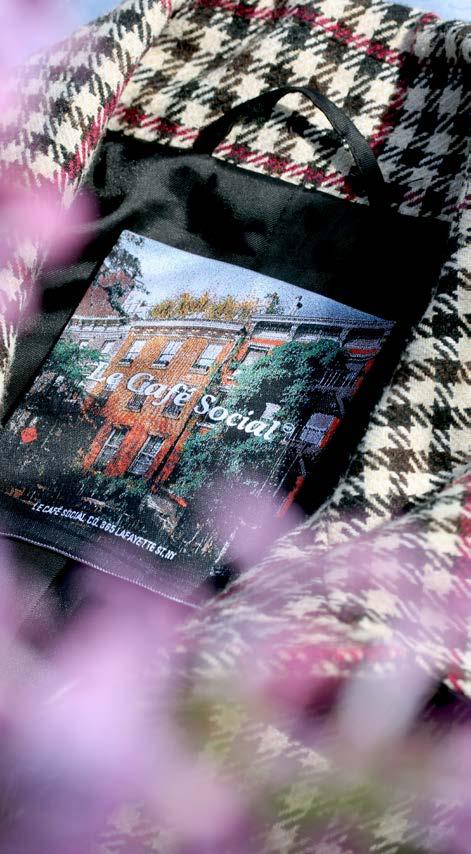
• Respect in the workplace
• Protection of company property
• Professionalism
Nilorn’s principles and work to prevent bribery and other types of corruption are summarised in the global anti-corruption policy. The policy contains the organisation’s mandatory rules and restrictions regarding gifts and other appreciations. It also describes the procedures for employees to raise any ethical questions or report any breaches or suspected breaches of the code.
98% of Nilorn employees signed the anti-corruption policy in 2022. No incidents of corruption were registered in 2022, neither at local locations, at Group level, via our whistleblowing system or in connection with suppliers.
WHISTLEBLOWING
In accordance with the 2021 Swedish Whistleblowing Act, we have integrated a centralised whistleblowing function to enable employees to report suspected serious irregularities or
misconduct. This will allow for a more homogenous process to voice inappropriate conduct and help us maintain our strong values and Code of Ethics. Our employees and suppliers have been informed about the new function. The effective use of the whistleblowing system will be reviewed every year to make sure that employees are aware of and feel comfortable using it. This will be done by the group CFO and communicated internally. One incident was reported in 2022.
AUDITS AND CONTINUOUS IMPROVEMENT
Our production in Bangladesh, China, Hong Kong, Portugal and Turkey is audited according to SMETA. Nilorn UK, Nilorn Germany, Nilorn India and Nilorn Pakistan will complete the SMETA audit in 2023.
In 2022, we also completed the Higg Facility Social & Labour Module (FSLM) in our Nilorn production units in Hong Kong, Bangladesh and Turkey. The FSML module measures the social impact of manufacturing across areas such as wages, working hours, health and safety and employee treatment.
Resource efficiency
Our environmental policy is our internal guide and basis for how we work with and integrate environmental responsibility. It covers all Nilorn employees, and we commit to evaluating, reducing and preventing the environmental risk and impact of our activities, products and services. The initiatives and goals described below are important steps in finding ways for us to operate more efficiently and improve resource efficiency.
In 2020, we applied the Higg Index for both internal and external production units, and in 2022, we took the next step towards external verification of our self-assessment in Nilorn Bangladesh, Nilorn East Asia, Nilorn Turkey, Nilorn Portugal and Nilorn UK. By working with the Higg FEM and the measurable data, we can set objectives that can easily be followed up. When seeing our environmental impact and its sources we can make decisions about where developments are required. We also collaborate with our clients directly on the Higg platform so that they can easily track and follow our modules.
We make use of Higg FEM as a tool to implement and improve a responsible chemical management program in our manufacturing facilities. Our chemical management system includes chemical assessment, purchase and incoming control, chemical inventory management, chemical health and safety to workers, chemical storage and handling, output management, process control and continuous improvement, which align with the requirement of ZDHC Chemical Management System Framework and Higg FEM chemical section.
Our operations must be compliant with all regulations relevant to our business together with our clients’
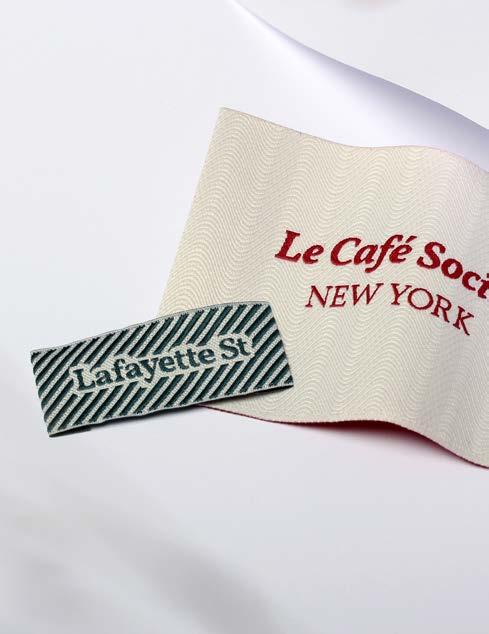
requirements. Chemical testing is done based on NRSL as part of our responsible sourcing program but also for specific clients’ requirements. Bureau Veritas is the nominated laboratory, but we also work with clientnominated laboratories.
In 2022, we started a trial to trace the lot number of chemicals used in production processes in Nilorn Hong Kong for selected items. We will continuously improve our chemical management system and will make use of the Higg FEM chemical section score as a key indicator to evaluate our performance.
Since 2021, Nilorn Sweden has the environmental certification from Svensk Miljöbas. The Swedish Environmental Base promotes sustainable development and reduced environmental impact. The association’s environmental management system is directed towards smaller organisations and their need to present well-functioning and documented environmental work to clients and other stakeholders. The standard for operations is based on ISO 14001, but with simplified documentation requirements, and focuses on actual environmental improvements and open environmental reporting.

ENERGY
We monitor our energy consumption and sources in all our offices and production facilities to ensure that we meet our goals for renewable energy. We check the availability of renewable energy to enable the transition. Our operations in Belgium, Denmark, Germany, Portugal and Sweden all use renewable energy through agreements. In some countries where we have production and warehouse operations, there is a limited supply of renewable energy. In Hong Kong, India and China, our team acquire the renewable energy certificate (REC) for parts of the total kWh.
Fifty seven per cent of our total energy consumption comes from renewable sources, and we continue to investigate
options to increase that number with the goal of achieving 100% by 2025. Our total energy consumption increased in 2022 by 3% compared to 2021, primarily in the Bangladesh and Portugal factories. The usage per square meter is reduced.
NILORN PORTUGAL
Nilorn Portugal uses the most energy out of Nilorn Group’s production units, 850 000 of total 2 200 000 kWh. They installed 460 solar panels in 2019. In 2022, the solar panels produced 15% of the factory’s total electricity consumption; the remaining is purchased electricity from renewable hydro energy.
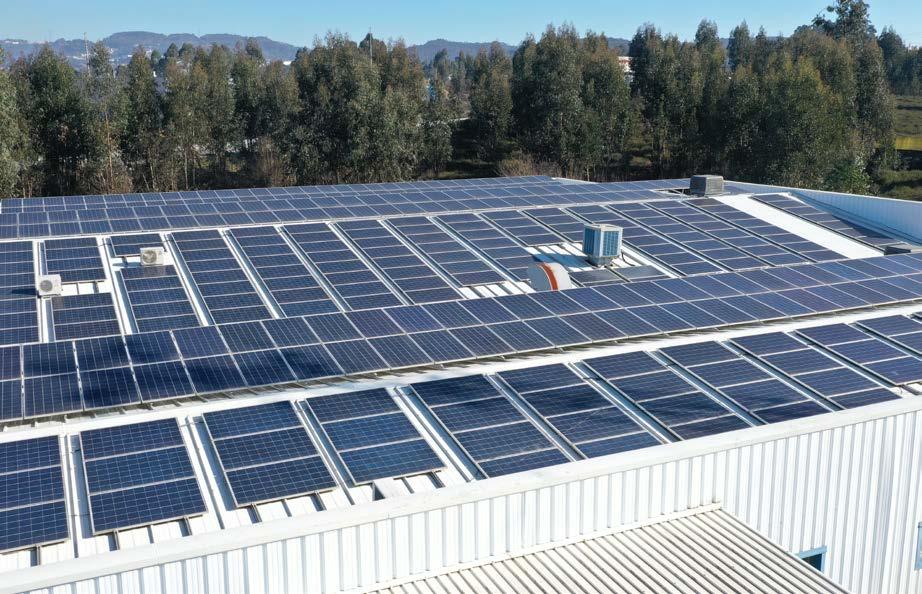
WASTE
Waste efficiency is part of our approach to managing our waste impacts during the production phase. As a manufacturing company, we purchase, use and transform materials in production, which in turn creates waste.
WE KNOW OUR WASTE CAN BE PART OF A MORE CIRCULAR TEXTILE INDUSTRY
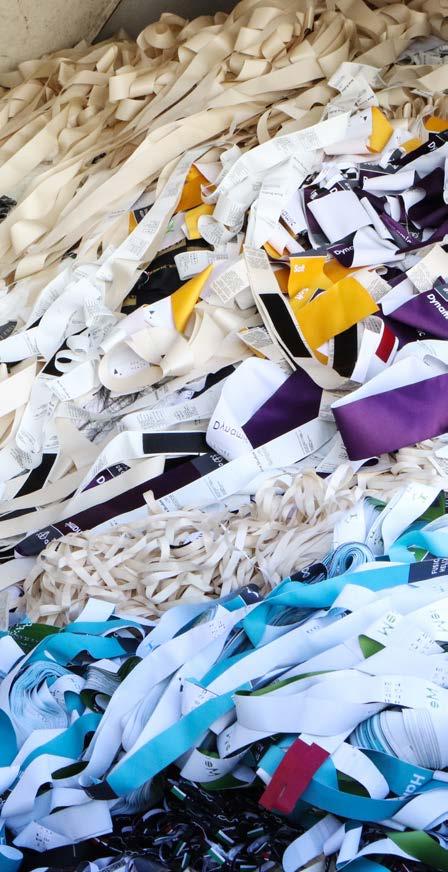
We have actively been searching for options to better utilise the waste from our production. Initial trials are ongoing with Nilorn Portugal and a Spanish textile recycling company where we evaluate if the textile waste from label production can go to better use. In the production unit we collect and separate the textile waste scraps from the weaving and label making processes. These are then sent to the recycler in Spain where they are used to produce new yarns, which are used to re-enter the European textile value chain (nonwovens, cleaning textiles). The recycling process is mechanical and the recycler at this stage mixes the textile waste together with used PET bottles to create yarns with desired properties. Developments are ongoing to create filament yarns but it is currently used for staple yarns.
A valuable recycling asset is the plastic stretch film used for protecting goods during transport. In 2022, we started separating the film at Nilorn Germany's distribution centre. After the material is washed, a German recycling company recycles it mechanically and produces a granulated transparent material. This material can be used to produce new transparent film. The film will enter the marker for recycled materials and be used, for example, as packaging/garment bags.
ZERO WASTE TO LANDFILL
We are working toward the goal of sending zero waste to landfill by 2025, an ambitious goal considering the current international markets we operate in and the complexity of infrastructures, waste streams and management. The amount of waste we produce shall be minimised and sorted as much as possible. The collection, transportation, recovery, and disposal of waste is outsourced and managed by each of our production units, and they assure all relevant permits, including waste disposal, are available. In 2022, we continued to increase the amount of waste sent to recycling, however 14% is still not being recycled (15% in 2021). This is critical for us to improve.
We continue to promote waste reduction and sorting, including improved sorting capacity in our production units. The products we produce mostly contain polyester, paper and plastics, and the most common waste stream from our production units is non-hazardous textile waste, e.g. polyester yarn and fabric. As described on page 35, the design process is important to reduce waste and simplify recycling.
WASTE (TONNES)
PAPER 63
PLASTIC 4
ORGANIC WASTE 2
OTHER 43 (including textile)
HAZARDOUS WASTE 31
WATER
To reduce our water impact, we have the goal of safe wastewater discharge through our work with control of used chemicals and certification of production. Although most of our manufacturing processes do not consume significant amounts of water, we nonetheless commit to reducing our impact on water resources. We also operate in areas of high water stress, including Bangladesh, so saving water in these locations is even more critical. To reduce the likelihood of our products, such as plastic garment packaging, ending up in natural waterways, we focus on providing recyclable products.
WATERAID
Water is a fundamental human right, but one-tenth of the world’s population does not have access to clean water. Lack of clean water has severe consequences in many areas. Women and children are often hit the hardest. In many parts of the world, it is the responsibility of women and girls to find and fetch water. Collecting water takes so much time and energy that girls miss out on education and women find it difficult to work or be active in society.
We follow up water consumption annually in all our facilities through reporting sustainability data, and water is an area in both SMETA audits and Higg FEM assessments. A majority of Nilorn’s total water withdrawals were used for manufacturing processes and the remainder for cooling domestic purposes such as sanitation, cooking or garden maintenance. In our Bangladesh factory, located in Dhaka close to a river, we reuse some water from the effluent treatment plant for gardening and fire drills. In our remaining locations, wastewater is sent to municipal treatment plants.
We engage with water related issues through our agreement with WaterAid. In 2022, a team of local experts visited our Dhaka factory. Toilets and handwashing facilities, drinking water, ETP and waste management were discussed. Good practice and areas of improvement were noted. There was also a visit to close-by living accommodation and an assessment of the current standard of water and sanitation. We now have a suggestion of areas to engage and drive improvements, for example this has led to improved routines when conducting mandatory drinking water testing, to assure the test sample is not contaminated. In 2023, the current training program will be updated to include more WASH-related information and employee training will also include impacts on the surrounding environment.
We are proud to support WaterAid’s work and we also participated in “March for Water” 2022.
WaterAid is an international organisation that works for a world where all people have access to clean water, toilets and hygiene. Every year, the organisation changes the lives of millions of people through increased access to clean water, toilets and hygiene in the world's poorest communities.
WaterAid collaborates with local partners for sustainable and long-term solutions, and influences decision-makers globally and nationally to increase priorities and efforts for these basic needs.
WaterAid is active in 34 countries worldwide and since its inception in 1981, over 28 million people have gained access to clean water and nearly 29 million have gained access to toilets as a result of WaterAid's work.
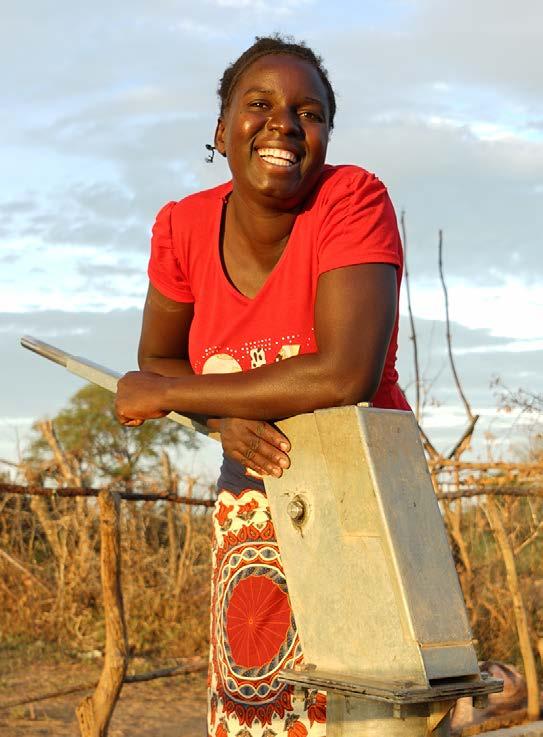
BIODIVERSITY
Nilorn’s own production units, offices and the products we deliver can have a negative impact on biodiversity and ecosystems, such as impact on water and plastic products not disposed of correctly ending up in the environment.
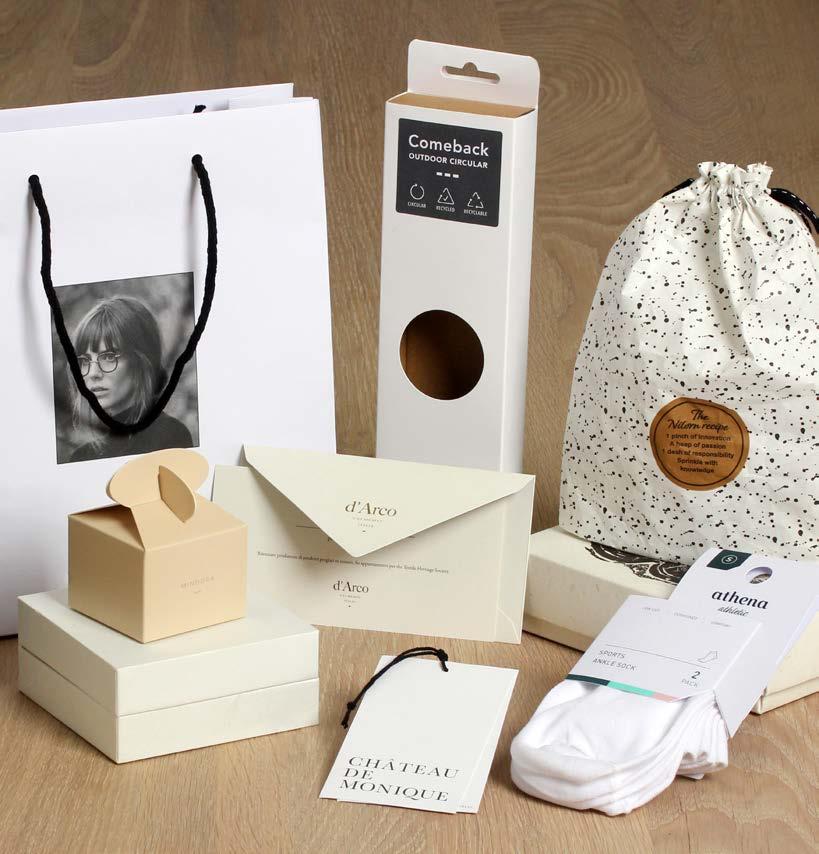
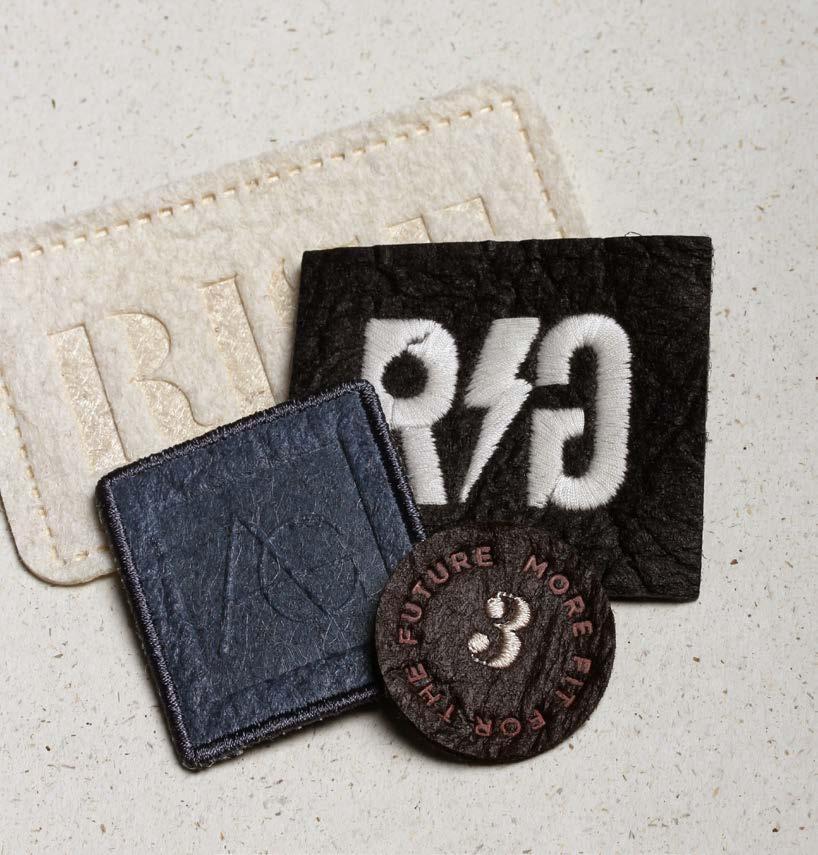
Acknowledgement of these risks is the first step for us to address the critical issue of increasing biodiversity and nature loss. With the Nilorn Basic Environmental training 2022, we raised awareness about biodiversity and ecosystems among our employees.
In 2023, we will further explore how we can assess biodiversity through the WWF Biodiversity Risk Filter and what and how to measure our own operations. Read more about how we address biodiversity in our supply chain on page 53.
PRODUCT DEVELOPMENT AND MATERIALS
We believe the products we develop and deliver play an important role in the transition of the fashion and textile industry. Carrying legally required labelling, guidance and recommendations supports consumers to make informed choices. In 2022, we saw increased legal requirements for packaging labelling in the EU market. We guide our clients through what can often be complex information and registration process, as well as procedures related to Extended Producer Responsibility. We can provide support for more preferred and/or certified materials to enable clients to improve their sustainability performance. Read more about how we work with product development and materials on page 24-35.
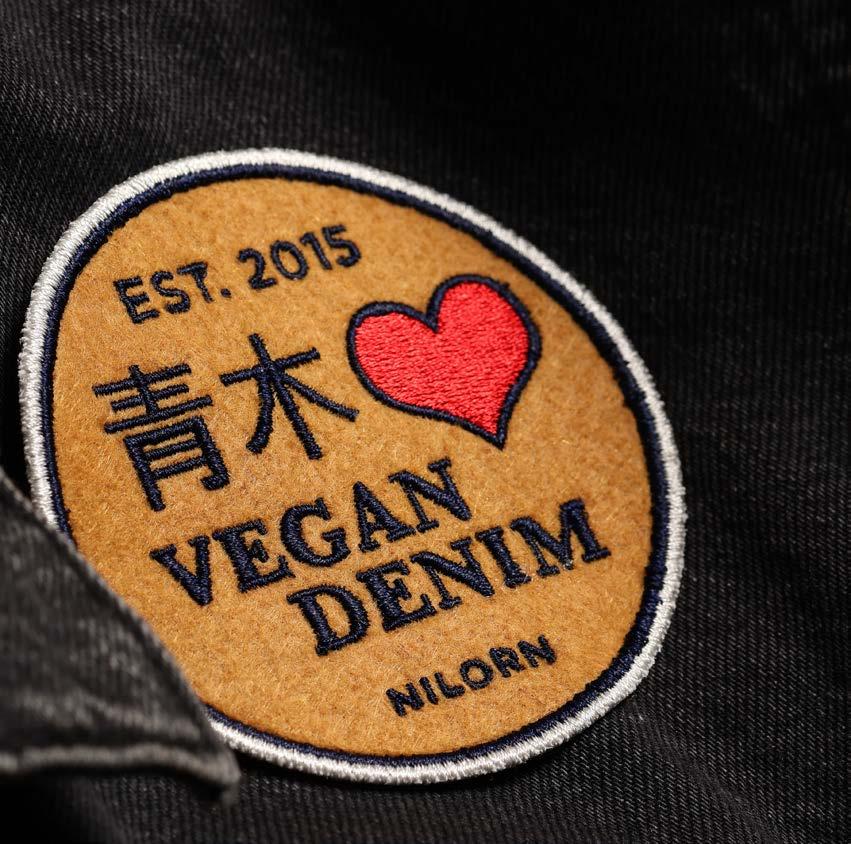
GENDER DISTRIBUTION 2022
Number of employees: 591 (553)
Diversity and equality at Nilorn
To be an attractive employer we take our responsibility for creating fair and equal opportunities for men, women and non-binary people seriously in the countries where we are present. We have internal policies and business practices that incorporate this vision in everything that we do, from our facilities to our management team, in all our locations.
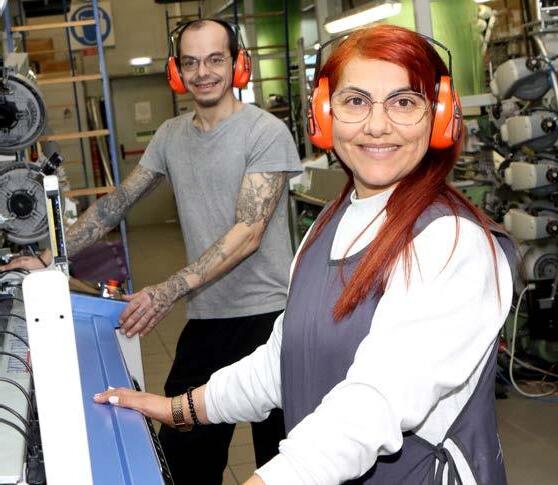
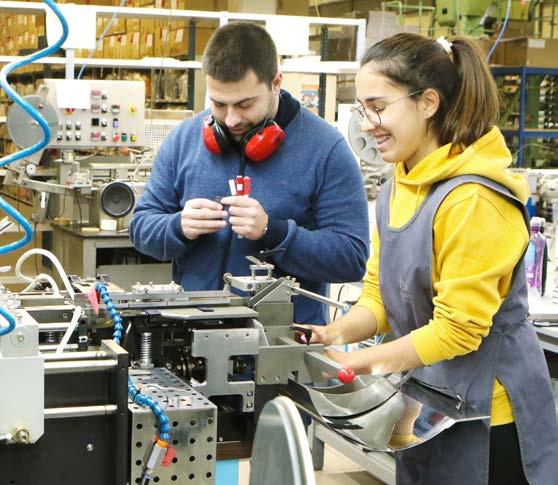
Diversity and equality at Nilorn are paramount. They are part of our values, they support our business goals and are considered a key aspect of our employee well-being. Our focus lies in creating a diverse workplace where all employees have equal opportunities, regardless of their socioeconomic background, religious beliefs, gender, sexual orientation or ethnicity. Diversity of people is a diversity of ideas, skills, and experience. A broader range of perspectives means we can better understand and meet the needs of our clients.
Our Human Resource Policy regulates what the company expects of its employees and what employees can expect of the company. The HR policy mainly regulates management responsibility for developing staff, information supplied to all employees, annual performance reviews, payments and IT usage. The overall objective is that work on gender equality should be a natural and integral part of all our activities and apply to all staff at all levels.
We also believe it is important that Nilorn employees feel comfortable voicing dissenting opinions and concerns in the workplace. Our employees can communicate their concerns to
managers, through our employee surveys and anonymously via the Whistleblowing tool.
Employees of Nilorn Belgium, Denmark and the worker committee in Nilorn Bangladesh are covered by a collective bargaining agreement (4%). Nilorn Sweden follows the agreement of (Unionen). We also have an internal system that ensures proper implementation of our policies and routines. To find out more about our internal controls on policy implementation, go to page 18. No incident of discrimination was identified in 2022.
Nilorn continues to grow, and the employee headcount increased by seven per cent in 2022. This growth is principally due to recruitment in Nilorn Portugal and Turkey. The gender distribution in the entire Group is 43% women and 57% men. 18% of managers are women. The long-term target is that neither men nor women will account for less than 50%. The focus for the coming years is to increase the age
balance and improve the gender distribution in the total workforce and among senior executives, it is a high priority throughout the organisation. Challenges for a more even gender distribution include low staff turnover in some regions, structural factors in our industry and that the business is conducted in countries where gender roles are largely traditional. In total 130 new employees (52 women and 78 men) and the employee turnover was 16%.
Maintain and improve health
Nilorn aims to be an employer of choice by offering a more sustainable, caring and safe working environment.
COVID-19 continues to have a significant impact on our work with employee health and safety. During spring 2022, Nilorn Shanghai was closed for two months due to lock-down and employees worked from home where possible. We switched to a hybrid more flexible model in our sales offices. For production units, the focus has been on communication and education, for example regarding use of face coverings and good hand hygiene. Each Nilorn location has been responsible for implementing proper workplace controls to help mitigate the spread through, for example, temperature screening, face coverings, disinfection of common areas and remote working.
According to the Swedish work environment act, as an employer we are responsible for occupational health and safety. We cooperate with employees and safety representatives about the work environment and occupational health and safety management in our headquarters. This means that we systematically identify, prevent, investigate and follow up on work-related activities that may lead to work-related illness or accidents. This includes both the physical and psychosocial well-being of all our employees. We do this through an external health service provider and safety representatives. Each Nilorn unit has a process for worker consultation, it can be, for example, worker committee, a suggestion box or worker representative. In Bangladesh, there is a Worker Participation Committee elected according to legal requirements.

There are different wellness programs and initiatives among the Group, some examples are wellness grants and access to fitness clubs, regular health examinations and additional consultancy
for those who need it, enhanced coverage for health-care professionals, health insurance, eyesight tests, e-bikes and service for personal support and life management.
Occupational health and safety is currently managed by each Nilorn location and based on national legal requirements. All production units are expected to adhere to the available standards and they cover areas such as emergency procedures, risk assessment, safety training programs, chemical management and personal protective equipment. Nilorn has a decentralised approach to identifying and investigating risks and hazards at the workplace. Each facility within the group is responsible for defining action plans that prevent and mitigate the risks identified and follow-up their implementation. Employees can also report potential issues directly to each Managing Director, and safety rounds are conducted on a regular basis at our production facilities. We promote a safe, healthy and secure environment in our own offices and production as well as our external suppliers’ activities.
Occupational health services are provided for employees. In the Bangladesh factory there is a doctor and nurse available during working hours, while in other countries the service is provided either by external service providers or the public health system. The focus of occupational safety at Nilorn is on preventive actions and raising awareness, i.e., risks and hazards are to be eliminated in advance where possible. Risk assessments are carried out, and training programs are managed by each production unit.
Reporting incidents is one way of identifying risks and working to make improvements. In 2022, 7 incidents were reported. All reported incidents occurred in production and warehouse departments and most common is hand injuries.
EMPLOYEE ENGAGEMENT REMAINS HIGH
Nilorn conducts a biannual employee survey, which gives a voice to employees and includes questions about well-being at the workplace and employee satisfaction. The survey, which consists of five multiple-choice questions (scale 0 – 10) and one open question, is anonymous; only the country of the respondent is revealed. The questions are translated into the local language and made available for all employees to reply. The number of responses increased from 466 in February 2022 to 506 in August 2022. In 2022, the average was very uniform among the questions, but with major variation between some markets. Areas where we received the highest/best values included corporate values and right conditions to do a good job. We identified two countries for improvement, and action has already been taken and will be followed up. We monitor and follow the trend to be able to act if it does not go as planned.
EMPLOYEE NET PROMOTER SCORE
eNPS score (Employee Net Promoter Score), describes the extent to which employees are ambassadors for our organisation.
eNPS is based on the question: On a scale of 0-10, how likely are you to recommend this workplace to a friend or someone from your professional network?
eNPS can range from -100 to 100. However, a score above zero is usually seen as a positive. Generally, a score within the 10 to 30 range is considered good and a score of 50 is excellent.
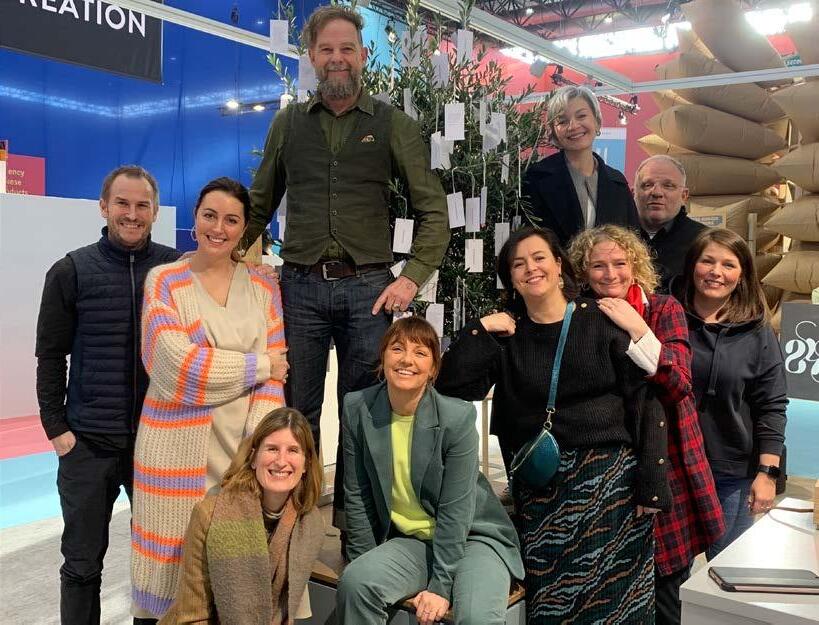
BUILDING WINNING TEAMS
In September 2022, Nilorn’s global sales team met in Odense, Denmark. We held workshops, training and an outdoor team-building activity.
EMPLOYEE DEVELOPMENT IN FOCUS
Attracting and retaining highly skilled employees gives us a strong competitive advantage and to achieve that, we need to offer an excellent work environment that supports our employees’ growth and development.
We believe all employees should enjoy their work and have job satisfaction. We want all employees to develop and grow along with the company. Training opportunities are an important tool to continuously increase skills and professional development. This is also a way to retain experienced co-workers and attract new talent. Furthermore, capacity-building is key to increasing all employees’ knowledge and awareness of issues that are important for the sustainable growth of Nilorn and our clients. Managers are responsible for employees’ training agenda. Nilorn regularly monitors employees’ general motivation and well-being through annual development appraisals. All employees will be offered annual performance reviews, in 2022, 92% of our employees completed their annual performance reviews with their manager. (51% 2021)
UPSKILLING OUR PEOPLE
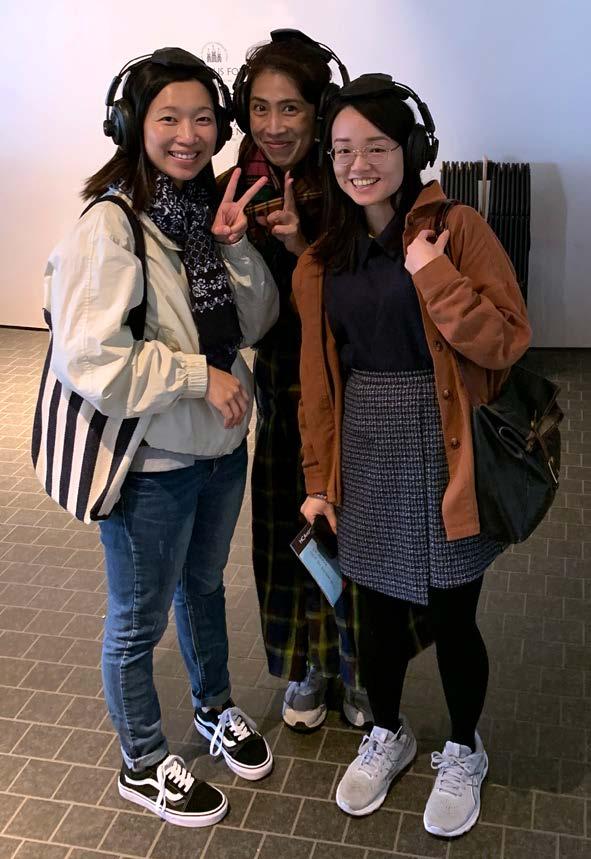
Our induction program ensures that new employees receive a broad understanding of Nilorn and how we operate. It sets the tone for our collaboration. In 2022, we introduced an induction session three times per year, where all new employees in the Group take part in a thorough presentation of the company run by management. It is a good opportunity for us to talk about who we are, how we work and our responsibilities.
As part of the Nilorn Sweden environmental certification, there is a mandatory requirement for basic environmental training for all employees.
In 2022, we continued our online training, with thirteen webinars covering topics including CSR, new materials and WaterAid. The average hours of training per employee was 11 hours.
KNOWLEDGE SHARING
In July 2022, Nilorn attended the AAFA Traceability & Sustainability conference in Pittsburgh. The U.S. is a relatively new market for us, and the event was an opportunity to get to know the market and the clients better. Topics on the agenda included regulatory landscape, PFAS, transparency, traceability, HRDD and more.
GHG emissions
Measuring and reducing our climate impact is one of our key priorities. We measure our business’s own climate impact, both direct (Scope 1) and indirect (Scope 2 and parts of Scope 3). We have a complex organisational structure, which makes our emissions mapping and follow-up challenging but we see the benefits of implementing Higg Index FEM and in 2023, we will explore how to use the data as a first step.
EMPLOYEE TRAVEL
CLIMATE CHANGE
Nilorn stands behind the vast scientific consensus that human-made emissions are a major contributing factor to climate change. We also recognise that businesses, as major emitters of greenhouse gases, have a significant role to play in reducing emissions. Strengthening biodiversity and nature has an impact on mitigating climate change.
The biggest challenge in developing our targets will be with the inventory of our Scope 3 emissions, especially the upstream and downstream product life-cycle emissions. We are already working with key suppliers to develop transparency on emissions caused by materials and finished products that we buy, but we still have some way to go before we have a full picture and it is a focus area for 2023.
Over the last three years, we have seen a dramatic decrease in international business travel mainly due to COVID-19 restrictions and resulting habit changes. This has resulted in an emission reduction linked to business travel. Nilorn operates from Asia to western Europe, northern Europe and the Americas. Business travel is normally one of our largest sources of emissions, and air travel generates more emissions per kilometre travelled than any other mode of transport. We plan to continue to use online meeting tools and practices in the future, to avoid unnecessary travelling.
Our internal car policy encourages electric and hybrid cars with lower emissions when replacing a car. Charging stations for electric cars have been installed at Nilorn’s units in Portugal, Sweden and the UK.
7 cars replaced with electronic or hybrid in 2022
LOGISTICS AND TRANSPORTATION
We are close to the ready-made garment industry in many parts of the world through our own companies and a network of strategic partners. We have warehouses in Dhaka, Hilden, Hong Kong, Istanbul, Karachi, Cononley, New Delhi, Recarei and Shanghai.
We are dependent on the transport sector and therefore, in 2022, our ability to deliver on time was impacted by the lockdown in China and logistic partners working with less capacity. Our network of production units made it possible to mitigate some of the risks by re-planning and moving some production. Efficient transport to ensure the distribution of goods is essential for our business, and in 2022, the work of mapping Nilorn’s complex global distribution network gave us a better understanding of the flow of goods. Knowing the emissions is crucial for being able to take action. In 2023, all of Nilorn’s nine distribution centres will be using the same business system. This will simplify our target setting and follow-up.
SHIPMENTS BY MODE OF TRANSPORT
AIR TRANSPORT
We see that we could reduce air transport. Today it is often used to meet clients’ deadlines, but we believe that through better awareness and dialogue together with clients, we can reduce the share of air transport and use it only when there are special needs regarding time requirements.
The share of air freight is high and the emissions caused by air transport represents 97% of the tCO2e of our 2022 measured transportation. Our goal is still to reduce air transport by 50% by 2025 (base year 2019).
SEA TRANSPORT
The forwarder used for sea freight is part of the Getting to Zero Coalition, a global alliance of over 150 companies with the aim to develop zero-emission vessels and make them commercially available by 2030. The strategy is to reduce greenhouse gas emissions from shipping by at least 50% by 2050 (compared to 2008 shipping emissions). At this stage the forwarder provides Less-than-container-load (LCL) shipments that are carbon dioxide (CO2) neutral from 2020 onward through a “Net Zero Carbon program” that leverages three fields of action: detection, reduction, and compensation. Sea transport accounted for approximately 8% of the transported parcels in 2022.
RAIL TRANSPORT
Our ambition to use more rail transport has not moved forward due to challenges in the logistic system caused by the war in Ukraine. However, for Nilorn, it is relevant to see how we can switch more transportation to less carbon-intensive alternatives and we evaluate how to better utilise rail transport options. Compared to sea freight, rail transport through Central Asia normally saves ten days, and a reduction of the environmental footprint by a >90% reduction of CO2 emissions compared to air freight. In 2022 rail transport was less than one per cent of all shipments.
Collaboration for impact
We participate in numerous initiatives and collaborations to demonstrate our commitment to social engagement and it gives us the opportunity to exchange knowledge and experiences with representatives from across the industry.
THE AMERICAN APPAREL & FOOTWEAR ASSOCIATION

In 2020, Nilorn became a member of The American Apparel & Footwear Association (AAFA), which represents more than 1,000 brands, retailers, and manufacturers. AAFA provides exclusive expertise in trade, brand protection, and supply chain and manufacturing to help its members navigate the complex regulatory environment. AAFA was formed in August 2000 through the merger of the American Apparel and Manufacturers Association (AAMA) and Footwear Industries of America (FIA).
FEDUSTRIA VZW
Fedustria VZW is the merger federation of the former nonprofit organisations Febeltex and Febelhout and represents companies from the Belgian textile, wood and furniture industry. Fedustria’s mission is to assist companies in successful development by safeguarding and strengthening their competitiveness. Nilorn Belgium has been a member since 2001 and the membership gives us access to information, support and training in areas like communication, sales, environment and sustainability.
DANSK FASHION AND TEXTILE

Dansk Fashion and Textile (DM&T) is the trade association for Danish textile and clothing companies, representing more than 375 companies. DM&T is nationally responsible for GINETEX in Denmark and gives its member advice, inspiration, networking and political work for the industry as well as its marketing. Nilorn Denmark has been a member since 1979.

SWEDISH TEXTILE IMPORTERS ASSOCIATION
The Swedish Textile Importers Association provides importers of textiles and related businesses with industryspecific services, helping us keep track of important regulations and information, such as customs duties, rules of origin, labelling and CSR. Nilorn has been a member since 2004.
SWEDCHAM HONG KONG
The objectives of the Swedish Chamber of Commerce in Hong Kong are to promote, study, extend, advance and protect business relations, investments and interests of Swedish and other organisations in Hong Kong. SwedCham participates actively in the International Business Committee (IBC), which provides a sounding board and forum for lobbying and discussion for international business representatives with the Government on matters of interest for Chamber members. Nilorn East Asia has been a member since 2017.
UK FASHION AND TEXTILE ASSOCIATION
The UK Fashion and Textile Association (UKFT) is a British network for fashion and textile companies, bringing together designers, manufacturers, agents and retailers to promote the business and industry in the UK and throughout the world. UKFT has a unique position, representing businesses from spinning, weaving and knitting to catwalk and aftercare. UKFT is the UK representative of GINETEX, the international association for textile care labelling. Over 2,500 companies hold membership, and by being a member, we get access to industry-specific business information, export advice and networking. Nilorn has been a member since 2017.

TEKO
TEKO is the Swedish trade and employers’ association for companies working in the textile and fashion industry with over 300 member companies. They represent the sector, both nationally and internationally, in all questions of common interest and inform clients, suppliers, media, the public and the government about the Swedish textile and clothing industry, its companies and its products. TEKO is also the national member for Sweden of GINETEX – the international association for care labelling. Sustainability is a high priority focus area for TEKO. TEKO’s Environmental Group is responsible for this, and the group includes member companies, of which Nilorn is one and authorities.
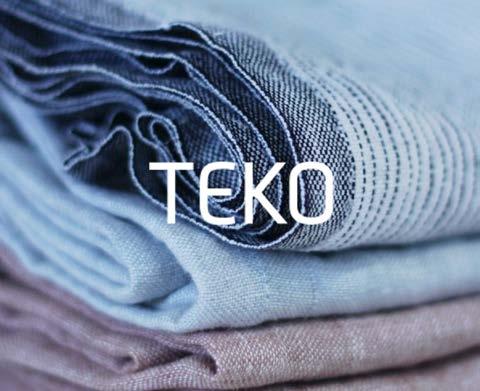
THE WAY FORWARD
Our long-term commitment to sustainability helps shape the way we work. Our strategy going forward is focused on involving the entire organisation, supporting our employees in driving change and working closely with our suppliers as they have a significant impact on our performance.
THE SUSTAINABILITY REPORTING LANDSCAPE IS RAPIDLY CHANGING
EU commission’s Corporate Sustainability Reporting Directive (CSRD) will amend the existing Non-Financial Reporting Directive and will substantially increase reporting requirements. As part of our CSRD Readiness work, we will in 2023 identify and close gaps to further strengthen and improve our reporting practice to assure we are meeting the new requirements.
OUR PRINCIPAL FOCUS AREAS:
• Consolidate supply chain, encourage partnerships
• Reduce dependency on fossil-based materials

• Investigate alternative transportation solutions to reduce emissions
• Prepare for updated ESG policy & compliance regulations
THE EU TAXONOMY
The European Commission describes the EU Taxonomy as a classification system that establishes a list of environmentally sustainable economic activities. It gives companies, investors and decision-makers appropriate definitions for which operations can be considered sustainable. The Taxonomy will play an essential role in scaling up sustainable investments in the EU and implementing the EU Green Deal.
Nilorn is obliged to report according to the EU directive on nonfinancial reporting and must state the extent to which the activities carried out meet the EU Taxonomy criteria. Nilorn’s principal economic activity, the sales and production of labels, is not yet included in the Taxonomy. Therefore, Nilorn’s share of turnover covered by the Taxonomy regulation is 0%. Furthermore, we
have analysed Nilorn’s investments and concluded that the share of the capital expenditure and operating costs covered by the Taxonomy is 0%.
Sustainability is a priority for Nilorn, so our goal is to increase the proportion of compliant activities as the Taxonomy develops.
PROPORTION OF OPEX FROM PRODUCTS OR SERVICES ASSOCIATED WITH TAXONOMY-ALIGNED ECONOMIC ACTIVITES – DISCLOSURE COVERING FY 2022
A. TAXONOMY-ELIGIBLE ACTIVITIES
A.1. Environmentally sustainable activities (Taxonomy-aligned)
OpEx of environmentally sustainable activities (Taxonomy-aligned) (A.1)
GRI Content Index
Statement of use: Nilorngruppen AB has reported in accordance with the GRI Standards for the period 1-1-2022 to 31-12-2022
GRI 1 used: GRI 1: Foundation 2021 Applicable
Information unavailable: Nilorn does not have an employee breakdown by type of contract.
Information unavailable: Nilorn does not have data on group level of workers who are not employeed.
Governance structure and composition
Nomination and selection of the highest governance body
Chair of the highest governance body
Role of the highest governance body in overseeing the management of impacts
Delegation of responsibility for managing impacts
Role of the highest governance body in sustainability reporting
Conflicts of interest
Communication of critical concerns
Collective knowledge of the highest governance body
Evaluation of the performance of the highest governance body
Remuneration policies
Process to determine
Information unavailable: Will be included in the coming years.
involvement and
Information incomplete: Economic development is a new material topic, and in 2023 we will update our current targets for material topics.
Information incomplete: Nilorn does not have an employee breakdown by age group, gender and region.
Information unavailable: Base year data. Calculation will be done in 2023 as more comparable data for Scope 1-3 is now available.
unavailable: No Group overview of assessments and programs. Local communites is a new material topic, and in 2023 we will update our current targets for material topics.
Sustainability data for 2022 has been collected using a web tool developed by Position Green.

Translation from the Swedish original Auditor’s opinion regarding the statutory sustainability report
To the general meeting of the shareholders in Nilörngruppen AB, corporate identity number 556322-3782
Engagement and responsibility
It is the board of directors who is responsible for the sustainability report for the year 2022 and that it is prepared in accordance with the Annual Accounts Act.
The scope of the examination
Our examination has been conducted in accordance with FAR:s auditing standard RevR 12 The auditor's opinion regarding the statutory sustainability report. This means that our examination of the statutory sustainability report is different and substantially less in scope than an audit conducted in accordance with International Standards on Auditing and generally accepted auditing standards in Sweden. We believe that the examination has provided us with sufficient basis for our opinion.
Opinion
A statutory sustainability report has been prepared.
Göteborg 2022-04-07
Mathias Arvidsson Authorized Public AccountantHeadquarters
NILÖRNGRUPPEN AB
Wieslanders väg 3
Box 499 501 13 Borås
SWEDEN
Tel: +46 33 700 88 00 info@nilorn.com www.nilorn.com
Subsidiaries & Partners
NILÖRN AB
Wieslanders väg 3

Box 499 501 13 Borås
SWEDEN
Tel: +46 33 700 88 00 info@nilorn.com
BALLY LABELS AG
Schachenstrasse 24
5012 Schönenwerd SWITZERLAND
Tel: +41 62 855 27 50 info@bally.nilorn.com
NILORN BANGLADESH LTD.
Plot 1361, 5th and 6th fl. Avenue 10
Mirpur DOHS
Dhaka -1216
BANGLADESH
Tel: +88 02 8835912 info@bd.nilorn.com
NILORN BELGIUM NV
Brusselsesteenweg 525 9090 Melle
BELGIUM
Tel: +32 9 210 40 90 info@be.nilorn.com
NILORN DENMARK A/S Kongensgade 31B

5000 Odense C DENMARK
Tel: +45 70 23 16 23 info@dk.nilorn.com
NILORN EAST ASIA LTD
Unit 1701, 17/F, Westley Square
48 Hoi Yuen Road, Kwun Tong Kowloon
HONG KONG
Tel: +852 2 371 2218 info@hk.nilorn.com
NILORN GERMANY GMBH Itterpark 7 40724 Hilden
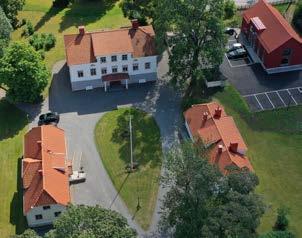
GERMANY
Tel:. +49 2103 908 16 - 0 info@de.nilorn.com
NILORN INDIA PVT. LTD
71/1 First Floor, Industrial Area Najafgarh Road
Shivaji Marg New Delhi - 110015
INDIA
Tel. +91 11 47093583/47091003 info@in.nilorn.com
NILORN ITALY
Via Enrico Fermi 40 41012 – Carpi (MO)
ITALY
Tel: +39 3381611351 info@it.nilorn.com
NILORN JAPAN
9th floor GranDuo IKEJIRI Bldg.
2-32-9 IKEJIRI, Setagaya-ku, Tokyo 154-0001
JAPAN
Tel: +81 3 64455 5290 info@jp.nilorn.com
NILORN THE NETHERLANDS
Werfstraat 2
9712 VN Groningen
THE NETHERLANDS
Tel: +31 592 310 030 info@nl.nilorn.com
NILORN PAKISTAN (PVT) LTD
2nd Floor, Yasir Chambers
Gulshan –E-Iqbal, Block 13A Main University Road P.O. Box 75300
Karachi
PAKISTAN
Tel: +92 21 349 92151 info@pk.nilorn.com
NILORN PORTUGAL –INDÚSTRIA DE ETIQUETAS, LDA
Rua Central de Barrosas, 304 4585 - 902 Recarei – Paredes PORTUGAL
Tel: +351 22 411 95 80 info@pt.nilorn.com
NILORN SHANGHAI LIMITED
Rm 605, No.258, Chengjiaqiao Road Minhang District, Shanghai 201103 CHINA
Tel: +86 21 345 512 90 info@sh.nilorn.com
NILORN SPAIN
Plaça Catalunya No. 1, oficina 442 08002 Barcelona
SPAIN
Tel: +34 93 545 1188 info@es.nilorn.com
NILORN TURKEY
Baģlar Manhallesi 49 Sokak No: 50
K:3
Baģcilar/Istanbul
TURKEY
Tel: +90 212 657 76 76 info@tr.nilorn.com
NILORN UK LTD Station Works
Greens Mill Court Cononley
N Yorks
BD20 8FE
UNITED KINGDOM
Tel: +44 1535 673 500 info@uk.nilorn.com
NILORN USA (EAST COAST) Box 365
Macungie, PA 18062
UNITED STATES
Tel: +1 201 874 5515 info@us.nilorn.com
NILORN USA LLC (WEST COAST) 3499 Meier Street
Los Angeles, CA 90066
UNITED STATES
Tel: +1 949 636 0343 info@us.nilorn.com
